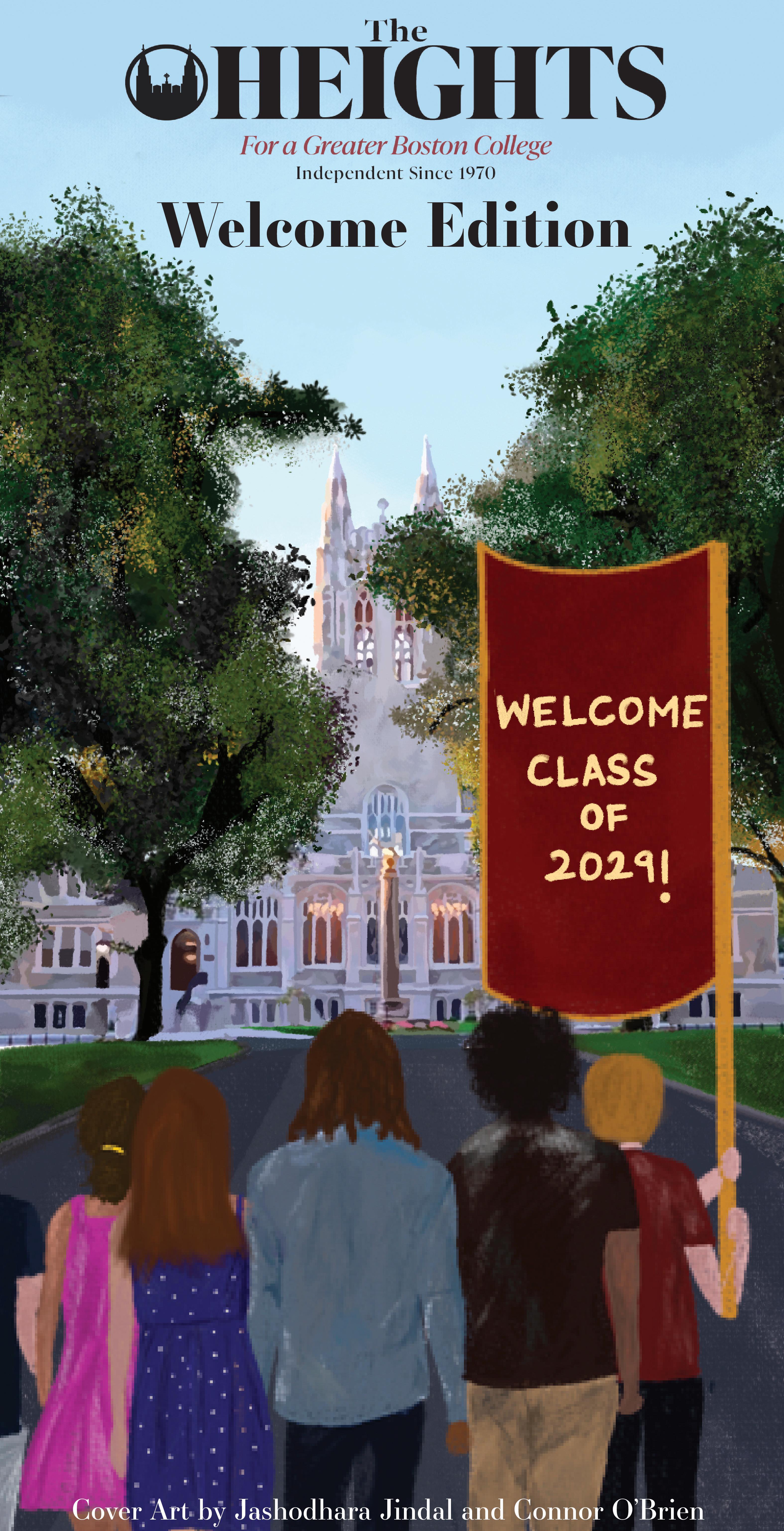

Welcome
A special print edition of The Heights, priming you on everything to know about Boston College for the year ahead.
Letter From the Editor: Welcome to the Heights
There are few times in life, if any, when we’re lucky enough to live within the kind of close-knit community college offers. Whether you’re waving at classmates on your way to a 9 a.m., making friends in line for the Maloney elevators, or exchanging a tired glance with someone from across the library at night, our four years at Boston College are defined by the connections we form.
Within those connections lie stories—stories about the people here, the campus they call home, and the things changing within it. Communities like ours thrive when we care about what’s going on within them.
That’s where The Heights comes in.
Wondering what went down at the protest on O'Neill Plaza? Who’s running in the student government election? Why a parade of sirens flew past you on the way to class? Turn to The Heights
Want to know what players to keep an eye on at this weekend’s big game? Or what to wear to the tailgate? The Heights has you covered.
Curious about what issues are weighing on the minds of fellow students? What’s buzzing in the campus arts scene? What’s going on just beyond the BC bubble in the city of Newton? You get the idea.
This special print edition is packed with everything you need to kickstart the year. Moving forward, you’ll see our newsletters in your inbox every Monday, Wednesday, and Friday morning with the day's top headlines.
For the most up-to-date coverage, follow us on Instagram, X, and Facebook.
We hope you take advantage of the coming year and immerse yourself in the rare opportunity of being here. The Heights is for you—and for a greater Boston College.
Happy Reading,

Will Martino Editor-in-Chief



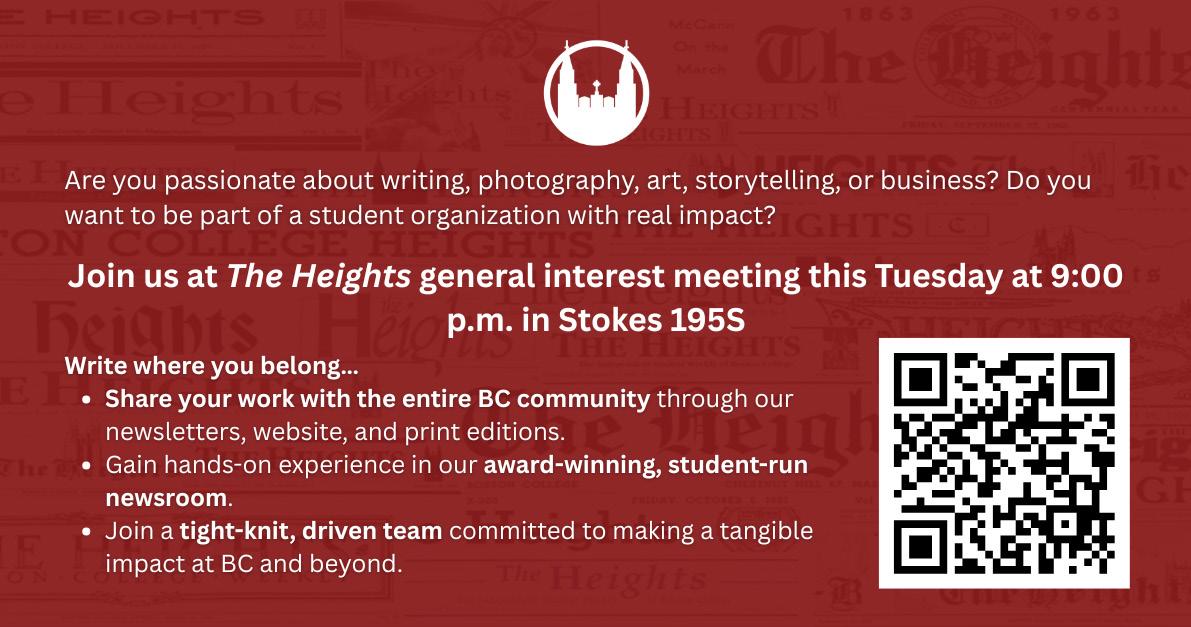
Editor’s Note: Annika Engelbrecht, Carina Murphy, Reetu Agnihotri, and Nikita Osadchiy—our news editors—have compiled the most important news stories from the past year to introduce the Class of 2029 to Boston College. From the announcement of a new University president to pushback over the University’s free speech policies, these are the stories to know.
BC Admits Record 12.6 Percent for Class of 2029
This story was originally published on March 27, 2025.
By annika EngElBrECht News Editor
Boston College admitted 12.6 percent of applicants to the Class of 2029, according to a University release—BC’s most selective class to date and a 2.1 percent decline from last year’s acceptance rate of 14.7 percent.
“Not only have these students distinguished themselves in the classroom, but they’ve given us great confidence in their ability to use their Boston College education to improve the lives of those around them, while also fulfilling their personal goals,” Dean of Admissions and Financial Aid Grant Gosselin said in the release.
Jessica Avalon, CSON ’29, had a gut feeling she would hear back from BC on the day she received her acceptance letter but still couldn’t believe the news once it had arrived.
“I’m in my car in the parking lot, and [my friend] is on the phone with me, and I just told myself ‘Yeah, well it’s not going to happen,’” Avalon said. “I was so convinced I wasn’t getting in. Then I got it, and it was just a lot of screaming for a long time. I was completely shocked.”
“
You’ve
Avalon, a current senior from Manchester, N.H., said she is looking forward to the community and student engagement at BC. “I come from a really small school— there’s like 60 people in my graduating class,” Avalon said. “Everyone is so attentive at games, I’m just so excited to be able to go to those and have fun with people who want to have fun.”
In line with last year, BC did not immediately release the percentage of admitted students who identify as AHANA+. Prior to the Supreme Court banning affirmative action, data on the racial and ethnic makeup of newly admitted classes was released at the same time as other admissions data.
In September, the University announced that the Class of 2028 comprised 37 percent AHANA students, though the statistic only included students who had self-reported their racial information.
According to the University, 12 percent of this year’s admitted students are first-generation college attendees, down from 14 percent for the Class of 2028. The University did not release the number of students who are QuestBridge scholars or Pell Grant recipients.
Read the full story online.


Free Speech Group Condemns BC’s Demonstration Policies
This story was originally published on March 11, 2025.
By nikita OsadChiy Asst. News Editor
In a letter to University President Rev. William P. Leahy, S.J., the Foundation for Individual Rights and Expression (FIRE) condemned Boston College’s demonstration policies for violating First Amendment principles, urging the University to eliminate its requirement that speeches and chants be pre-approved prior to demonstrations.
Got To Know
“As a university that has stressed its ‘long-standing commitment to protecting the right to free expression, including the right to protest,’ BC must remove this sweeping pre-approval requirement and make clear that students can spontaneously speak their minds without the university’s veto,” the letter reads.
FIRE’s letter referenced a Heights article detailing restrictions placed on a pro-Palestinian demonstration last month by University administrators, requiring organizers to revise and omit parts of their speeches, adjust their chants, and wait 80 days for event approval.
“This lengthy approval time is wildly in-
consistent with the policy’s requirement that students provide ‘three business days’ of lead time,” the letter reads.
In a statement to The Heights, University Spokesman Jack Dunn maintained administrators did not purposely stall the approval process, attributing part of the delay to a monthlong winter break. He also reiterated BC’s commitment to protecting the right to free expression but noted its focus on student safety as well.
Read the full story online.

You’re Welcome To Be Here”: A Q&A With Boston College’s Next President
This story was originally published on Feb. 24, 2025.
By Will MartinO Editor-in-Chief
For all that is said about 15 minutes of fame, people rarely talk about the 15 minutes that precede it.
Haub Vice President for Mission and Ministry Rev. Jack Butler, S.J., was sitting in his office at about 12:50 p.m. on Tuesday when he found out the Board of Trustees had elected him as the next University president of Boston College.
By 1:05 p.m., the news had been emailed out to the rest of the BC community.
Given just 15 minutes to reflect on this new role before being thrust into the spotlight, Butler isn’t ready to talk about comprehensive plans just yet. He won’t officially take over as University president until the summer of 2026, leaving him time to wrap things up in his current role, take a sabbatical, shadow current University President Rev. William P. Leahy, S.J., and, somewhere in the mix, decide the future direction of BC.
Still, after 23 years on campus, he’s no stranger to BC and what he lacks in logistical specifics, he more than compensates for with vision.
Butler welcomed The Heights into his office for an interview, offering an early glimpse into who he is, how he leads, and where he plans to take BC.
Editor’s note: The following interview has been edited for length and clarity.
Q: Fr. Butler, let’s play hardball: Where are you from?
A: Atlanta, Georgia.
Q: Do you go back often?
A: Not as often as I’d like. And you know what? Honestly, I’ve been here for so long—this is my home. That’s my home of origin. Maybe that’s a better way of putting it.
Q: Was there a moment in your years as an undergraduate that led you to pursue a career in higher education?
A: Absolutely not. In fact, I never thought I’d be in higher ed. When I entered the Jesuits, I thought I was a “Decree 4 baby.” Decree 4 is a particu lar document for the Jesuits that was about social justice and working with the poor, and that got me interested in prisons and working with people in the street.
An opportunity came at Boston College, and I came here, fell in love with Bos ton College, fell in love with the students, and found that we can really do wonderful things here—that whatever tomorrow is, it already exists
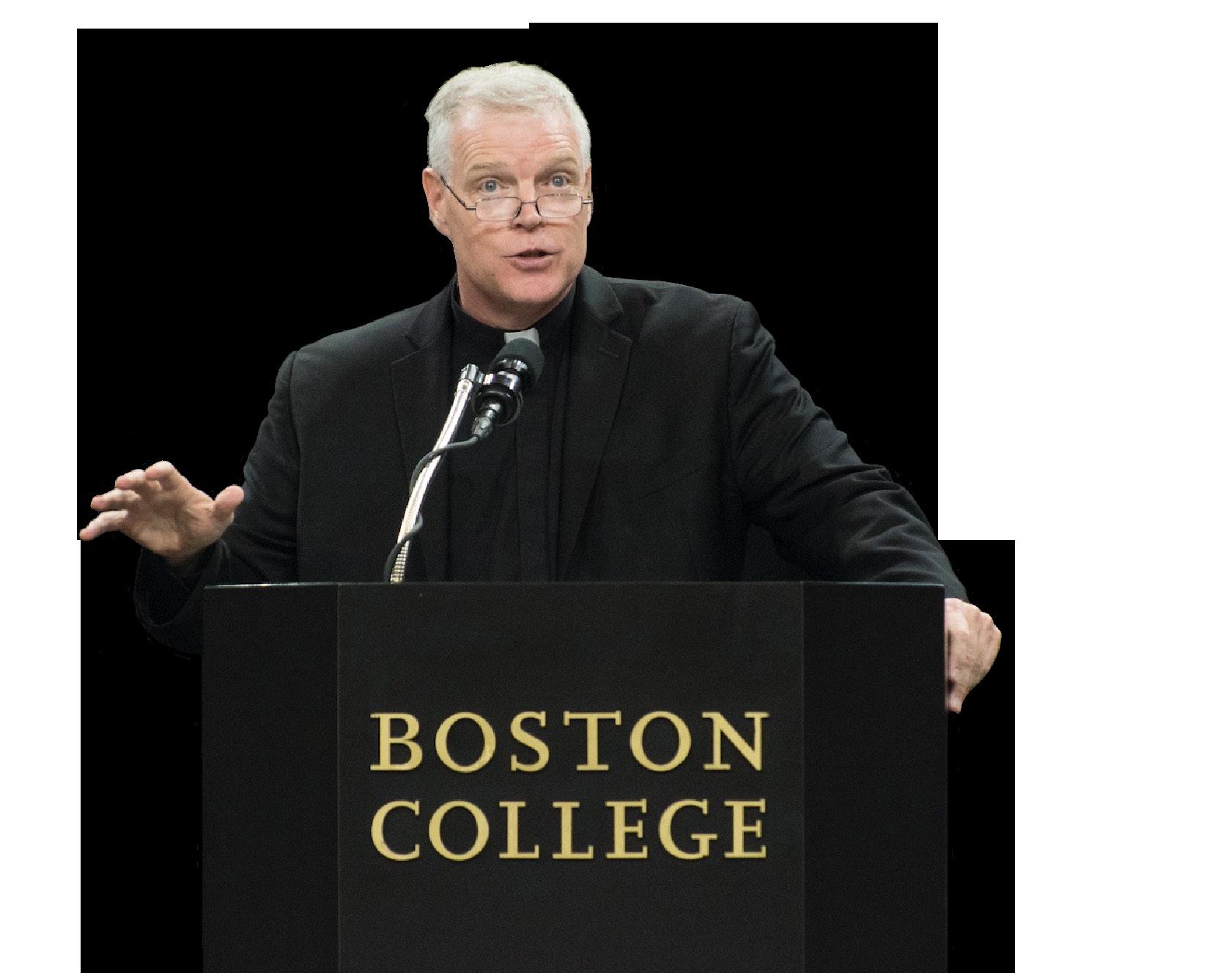
Q: A lot of your work at BC has been very hands-on and involved with students. As University president, do you intend to maintain this outward-facing presence on campus?
I don’t think Fr. Leahy gets enough credit. He might be one of the most student-engaged presidents I’ve ever known, but he does it I want to be known by lots of people, because I like people, and I want to be present in the community so students can see me. But I have a job to do that’s a little different, and I’ve got to be responsible for making sure that BC
Q: Speaking of Fr. Leahy—your predecessor raised more money than any University president in BC history. You have helped raise nearly $40 million over the past six years. Tell me a little bit about your method and strategy for
A: My method and strategy is to be a good human being and engage people relationally. BC sells itself, and when you talk about our needs, people want to help us. People are good and generous, so it’s not as hard as you might think.
Q: Many higher education administrators have attracted public scrutiny for their responses to campus conflicts over the past few years. Do you have a philosophy for handling any controversies that might

Kulbieda and Marino Elected Next UGBC President, VP
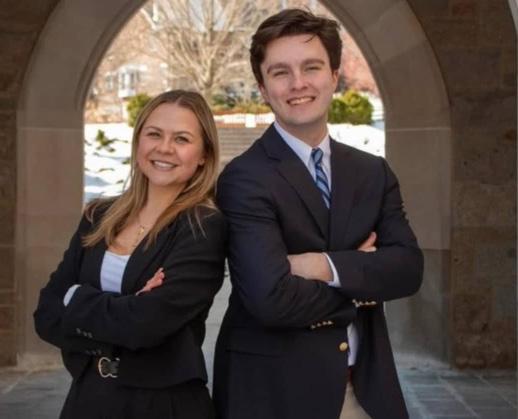
This story was originally published on March 21, 2025.
By Carina Murphu Assoc. News Editor
Cami Kulbieda, LSEHD ’26, and Reagan Marino, MCAS ’26, are the next UGBC president and vice president, coming out on top of Thursday’s three-ticket election.
“I’m extremely grateful that the Boston College community has entrusted me to serve them,” Kulbieda said. “As promised, no student need will go ignored if it’s brought to my attention.”
Thursday’s election drew a turnout of 3,240 students, marking a 496 percent increase from last year’s uncontested race, where only 543 students voted. This year’s vote count also surpassed the 2023 total of 2,997 votes. Kulbieda and Marino won 1,244 votes, or 38.89 percent of the
total. Jack Adams and Chase Gibson, both MCAS ’26, won 1,129 votes, or 34.84 percent, while Andrew Cimino, MCAS ’26, and Brody Whetzel, LSEHD ’26, finished with 867 votes, or 26.75 percent.
Kulbieda and Marino campaigned on a platform focused on UGBC outreach, advocacy, and accessible resources for students. According to Kulbieda, once she and Marino step into their new roles, transparency will be an immediate priority.
“I think no matter what efforts and changes that UGBC is working towards and implementing, the most notable change that we can make is having these be transparent and accessible to the student body,” Kulbieda said.
Looking beyond the election’s outcome, Kulbieda also expressed gratitude for Marino throughout the election process.
“One of the most rewarding parts of this whole process has been the friend-
ship that we’ve formed over the past few months,” Kulbieda said. “It is an absolute honor to have this title and also to get to do it with him.”
In addition to the presidential race, 11 student senator seats were up for re-election.
The Class of 2028 elected five senators—Jordan Doty, Will Cortes, Makayla Boxell, Sarah Kemper, and Ashley Varacalli, all MCAS ’28—to represent their class.
The Class of 2027, which had four seats to fill, elected Aidan Krush, CSOM ’27, Addie Weiss, Mariame Diop, and Will Rafti, all MCAS ’27. Cristina Gregory, and Andrew Pauloz, both MCAS ’26 and the only two candidates in the class of 2026 race, were elected to represent their class. Read the full story online.

JASHODHARA JINDAL / HEIGHTS EDITOR
Newton
Editor’s Note: Genevieve Morrison, Laney McAden, and Riley Del Sesto—our Newton editors—compiled the most important stories from the past year to introduce the Class of 2029 to Boston College. From a shooting trial to a tobacco ban, these are the stories to know.

Tobacco Ban Finds Support Among Young People
story was originally published on April 15, 2025.
By Riley Del SeSto Asst. Newton Editor
Massachusetts is beginning to fight back against the detrimental effects of tobacco, and Newton has become a microcosm of a growing debate.
Back in January, the Newton City Council voted to pass a “generational ban” on tobacco sales, forbidding the sale of tobacco to anyone born on or after March 1, 2004, which some have criticized as “hypocritical” and “bullshit.”
But the young people subject to the ban seemingly tell a different story.
“[I think] this ban will help people from ever becoming addicted to tobac-
co or nicotine in the first place,” said Christopher “Jack” Eagan, MCAS ’28 and a West Newton resident.
The Heights spoke with Newton residents attending Boston College to learn more about how young people perceive the city’s “generational ban.”
Grace Currid, MCAS ’28 and West Newton resident, supports smoking prevention, especially for younger generations.
“I think the idea behind Newton’s ban on tobacco products, on young people, is well-intentioned, because we have well-documented health risks that nicotine use is really bad for our health, and it’s addictive,” said Currid. “In reducing access, this could help prevent young people from developing addictions and promote overall public health.”
According to the National Library of Medicine, smoking is one of the leading causes of preventable death, causing more than 8 million deaths each year worldwide.
Eero Helenius, MCAS ’25 and Newton Highlands resident, has heard general support for the ban from his peers.
“At least the people I’ve interacted with have seen it as a positive policy, but it is certainly the radical one,” said Helenius.
In 2024, the CDC found that 63.9 percent of students who currently use e-cigarettes reported wanting to quit, and 67.4 percent attempted to quit the year prior.
Michael Mi, CSOM ’25 and Newton Centre resident, thinks this ban could also prevent residents’ use of other
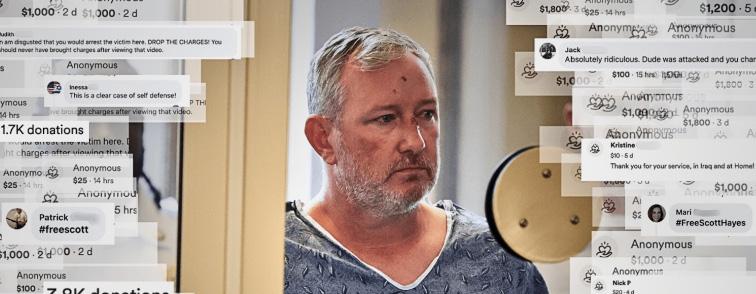
This story was originally published on Sept. 18, 2024.
By Genevieve Morrison Newton Editor
Update: As of June 7, 2025, Hayes is on probation through a deal with the Middlesex District Attorney. If he complies with conditions for three months, the state will drop its case against him.
Donors have raised more than $250,000 as of Tuesday night for the legal defense of Scott Hayes, the alleged shooter in a violent altercation that took place at a pro-Israel protest in Newtonville on Thursday.
Video footage of the altercation shows Newton resident Caleb Gannon
exchanging words with the protestors across Washington Street in Newtonville, then eventually charging across the street and tackling Hayes.
In the footage, the protestors attempt to subdue Gannon before he is shot.
Hayes said he will plead not guilty to charges of assault and battery with a dangerous weapon on Friday. Gannon has not yet been charged with a crime, though District Attorney Marian Ryan said she applied for a criminal complaint against him for assault and battery.
Gannon was hospitalized but is expected to survive, according to Ryan.
Since the incident, Hayes’ story has reached a national audience and an outpouring of support through the GoFundMe page set up for his legal defense.
Yael Magen, the lawyer who represented him at his arraignment, said she set up the fundraiser because she believes Hayes acted in self-defense.
“He was violently attacked from behind, his life was at risk, and he had no choice but to act in self-defense,” Magen said.
Among the thousands who donated, many agreed that the shooting was an act of self-defense.
“I saw the video,” wrote Maura Cousar, who donated $50. “His gun fired by accident in the chaos. Scott is being vilified by the media. I stand with Scott.”
Read the full story online.

Centre Plaza Worries Businesses
By SunDeRya ulziiBolD
Masterson, co-owner of Johnny’s Luncheonette in Newton Centre, expressed strong opposition to the mayor’s plan to convert a parking lot into a plaza. She emphasized that the city has not yet adequately addressed the parking needs of businesses, an issue that will be exacerbated by the loss of 51 parking spaces.
Masterson explained most businesses don’t have parking associated with them, making it a struggle for even owners and employees to find parking during busy times.
“We currently do not have enough parking for the business that we do have, so to take away spaces without addressing the current … spaces is counterproductive to the success of our businesses,” Masterson said.
Masterson explained that the local
businesses in Newton Centre were not consulted or informed of the changes until the mayor’s newsletter was published last week.
“We provide a lot of benefits to our whole region, and we do support the community in a lot of ways,” Masterson said “So to be completely shut out of the planning process for this just doesn’t feel right because they’ve already got a timeline, and then started talking to us. So it’s like, well, so you’ve [the local authorities] already decided.”
“It does seem to be a little less of a collaborative effort,” says Ericka Harindranath, owner of Farmstead Table, regarding the relationship between businesses and city government when it comes to conflict resolution.
Read the full story online.

drugs.
“I also think that nicotine and then smoking is kind of a gateway to trying harder drugs,” said Mi. “So if you start at the base and ban this type of stuff, then people aren’t going to really be willing to experiment with harder drugs.”
Mayo Clinic found that smoking regularly from ages 18 to 20 results in greater odds of nicotine dependence and lower odds of eventually quitting smoking.
“I do think that there are Newton residents that are my age, that are already addicted to tobacco or nicotine, so that wouldn’t change necessarily,” Eagan said.
The International Agency for Research on Cancer found that banning tobacco for people born between 2006
and 2010 could prevent 1.2 million lung cancer deaths by 2095.
Mi agrees with a generational ban instead of a complete tobacco ban.
“I think that the idea of a generational ban is really good, because then if people aren’t dependent on it when they’re younger, then when they’re adults, they’re not gonna really need it or want it anymore, either,” Mi said.
On the contrary, Lucas Doung, MCAS ’27 and Newton Highlands resident, believes a generational ban is too arbitrary and can feel unfair.
“I think that they should have either gone all the way and just banned it for all ages, or had no ban at all,” said Doung.
Read the full story online.

This story was originally published on March 16, 2025.
By Genevieve Morrison Newton Editor
Growing up in Newton, Marc Laredo never had a free moment.
“I had a paper route,” Laredo said.
“I worked at a local restaurant as a dishwasher, busboy, short-order cook, night manager, waiter. I worked for the Newton Parks and Rec Department for several summers. I was one of the captains of the cross-country team. I ran indoor and outdoor track.
I wrote for the school paper.”
When he moved back to the city after graduating from Cornell University and the University of Pennsylvania Carey Law School, he took on a similarly rigorous schedule as a father, a founding partner at a Boston law firm, and a Newton School Committee member. In 2012, he exchanged the school committee for a seat on the Newton City Council, then he was upgraded to city council president in 2023.
Now, with the help of several calendars and some caffeine, he’s campaigning, unopposed so far, for mayor.
“I’m drinking lots of coffee,” Laredo said.
While Laredo has spent his life wearing many hats, he feels he’s ready to let the rest go—committing to stepping down at his firm and in the city council—in order to take on the biggest job in the city: mayor.
“I’m at a point in life and financially and otherwise, and not having any young kids at home anymore,
here. It’s a vibrant community, which I think is really important.”
Laredo is a founding partner at Laredo & Smith, a Boston-based law firm that deals with business litigation, employment law, and white-collar criminal defense. Laredo said much of his work focuses on helping businesses to prevent legal issues before they arise.
“Try to get your clients up front to do the right thing, to treat each other, to treat people fairly, and if they do those things, try to protect them so they don’t get themselves into trouble,” Laredo said. “But sometimes people come to us after the fact they’ve done whatever they’re going to do. We can’t, we can’t fix it that way. All you can try to do is minimize their troubles as best you can.”
Laredo said his experience helping businesses navigate the law would directly apply to the job of mayor.
“I know how to analyze issues, I know how to deal with organizations, both problem-solving and management aspects, and so I think I’m coming into city hall, hopefully, really well-equipped in that regard,” Laredo said.
Laredo first met Mark Smith, Laredo’s firm partner since 1999, while working together in the criminal bureau of the Massachusetts attorney general’s office in the late 1980s. Their first collaboration was on a securities fraud case against a man who was scamming Haitian immigrants, according to Smith.
“This fascinating case was a huge undertaking about this kind of con man who had focused on the
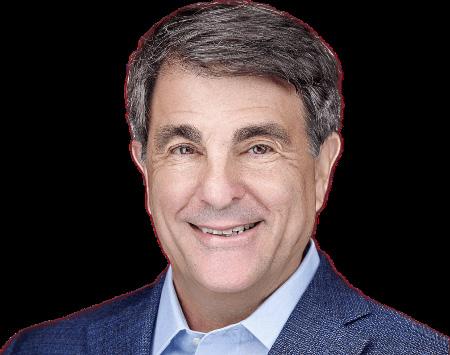
This
WILL MARTINO / HEIGHTS EDITOR, SOURCE: ASSOCIATED PRESS
Magazine
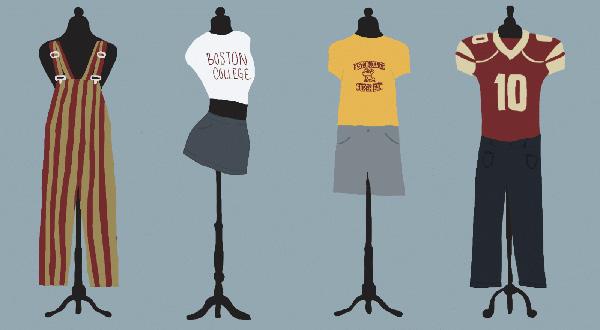
What Your Game Day Outfit Says About You
By Kate Kissel Assoc. Magazine Editor
Boston College football is back, and with it, the need to craft the perfect game-day outfit. Your getup serves many important purposes—whether it’s providing comfort for a long day of rallying, matching the aesthetic of your Instagram feed, or leaving room to gulp down 10 hotdogs before halftime. All in all, it wouldn’t be an exaggeration to say your outfit can make or break your Saturday.
As students crowd into the Mod Lot to tailgate, different characters reveal themselves through their choices of apparel. Though every student surely has a unique sense of style, gameday outfits seem to almost always fit within a few narrow categories.
No matter the particular goal your outfit serves, your choice can tell a lot about you and your approach to BC’s best day of the week: gameday.
Superfan Shirt
The hordes of Boston College fans sporting their yellow t-shirts couldn’t be missed on our first gameday of the year, for better or for worse.
These tees said one of two things: you’re either a freshman who didn’t invest in merch before coming to college or a senior who matched with their “Modmates” to commemorate their last first gameday at BC.
A basic, but nevertheless timeless choice, these fans can’t be blamed for their outfit decision at the first game of the season. Regardless, let’s all hope that was the last gameday where the stands are swept in bright yellow.
Striped Overalls
The striped-overall sporters are
This story was originally published on Sept. 5 , 2024.
By Juliana Parisi Heights Staff
For many college students, finding a roommate freshman year can be a tossup. You can either room with someone you instantly click with, someone you talk to maybe once a day (a couple of grunts or nods in your direction as well if you’re lucky), or someone you despise.
However, a new category of freshman-year roommates has emerged: the ingenious website-creating duo.
Computer Science majors Sebastian Pucher and Andrew Boessen, both roommates and MCAS ’26, turned their freshman year double into a startup: Eagle Eval. The website provides Boston College students with written
working hard to transform the parking lots of our Jesuit institution into a rowdy frat mixer. They will be the loudest ones at your tailgate, and will most likely grab more than a few blueberry muffins amid conversations with your extended family.
Going all-out for game day is just their thing, and you shouldn’t be surprised at their near constant feature on the big screen. Beware of sitting down during halftime around one of them though, as they will be sure to hype you up out of it.
Bringing the energy and the vibes, these endearing BC fans are some of the most memorable, and the most fun.
A Dress
Taking a page from the SEC, these fans are helping to reclaim BC as a football school to rival Alabama and we are here for it.
You know they are accessorizing with fun sunglasses and a cowboy hat, serving a classy, yet fun look that will help them end the day with the best Instagram content.
We’ll all be wishing we tried a little harder after scrolling through the post-game feeds, but luckily enough there’s always the next game to transform the parking lot into your personal runway.
Custom BC Gameday Apparel
Preparing for game day by scouring not just the overdone bookstore apparel, but going the extra mile and looking on Instagram to purchase handmade pieces, these fans mean business.
Armed with the cutest fits of anyone at the tailgates, they are 100 percent having the game day of their dreams. But don’t worry, they’ll be sure to tell you where they bought their shirt and that you need to get one too. I would act fast, as these unique pieces sell out quickly, and will continue to be a great way to rock BC gear in a more subtle, trendier way.

information and numerical ratings for professors and courses, and already has an estimated 2,000 users, Boessen said.
When looking for freshman-year roommates, the two sophomores originally met through social media and bonded about their shared interest in technology.
“When I was looking for roommates, I remember I looked at a lot of Andrew’s projects, and we just kind of clicked,” Pucher said. “That then led to this year and our brainstorming of larger projects that we could do.”
Both Pucher and Boessen came to Boston College with experience in the computer science world. In high school, both participated in computer science clubs and tested their luck in computer science competitions.
“As long as I can remember, I’ve just really been passionate about tech and kind of getting hands-on experience
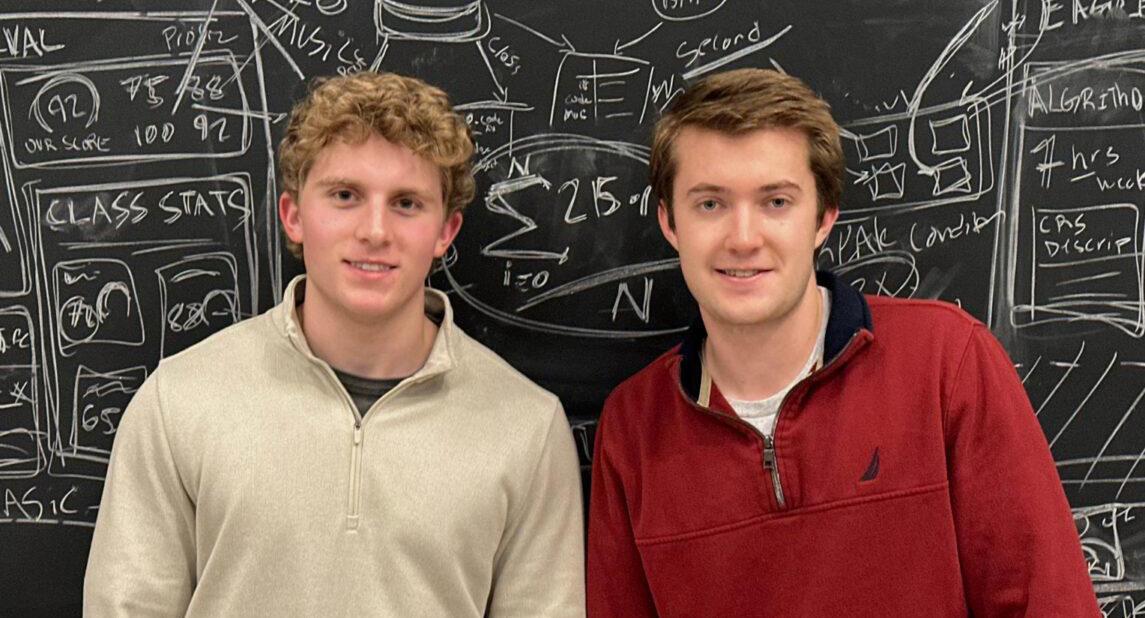
Editor’s Note: Veronica Pierce, Kate Kissel, and Elizabeth Maher —our magazine editors—have chosen long-form features as well as tips and trends pieces to prep you on everything to know as an incoming student.
“What are We?”:
Examining “Situationships” and Hookup Culture at BC
This story was originally published on Feb. 14, 2025.
By Kate Kissel Assoc. Magazine Editor Veronica Pierce Magazine Editor
“So what are we?”
It’s a question many Boston College students find themselves asking as they try to decipher a “situationship.” From dinner dates to hookups, situationships leave a lot open to interpretation.
This brand of casual, if not messy, relationship has taken the dating scene by storm. These days, you’re more likely to find students checking if they got a Snap back than twirling linguine on a night out in the North End.
Traditional “dating” is quickly being replaced by this easier, low-commitment option—and neither students nor faculty are thrilled about it.
Four Years of Difference
Complicated and convoluted dating trends arise as soon as students start their freshman year at BC.
Bo Brainerd, MCAS ’25, experienced these trends firsthand and was not a fan.
“Freshman year, everyone is brand new to everyone,” Brainerd said. “Everyone’s hooking up—it’s giving the college experience. You’re on Snap, you’re on all the dating apps, you’re meeting people out at random parties and bars that you’re getting into.”
Some of the current BC freshmen feel the same way.
Megan Woods, MCAS ’28, and Ellie Poitras, LSEHD ’28, came into freshman year expecting a little bit more from the dating scene.
“I definitely thought it would be a bit better than it is,” Woods said. “We live on Newton, and we’ve heard a lot of people
from Newton get married when they meet each other.”
Woods attributes the lack of relationships to students either not being ready to commit or still being caught up on their high school ex. By sophomore year, some BC students start to want more committed relationships.
Yet, many are met with the difficult reality that if they aren’t already in a relationship, they must revert to hooking up with peers.
“So, sophomore year, I was like, ‘OK, I want a boyfriend,’” Brainerd said. “And then I realized, it’s the same hookup culture, and it’s the same issue, and plus, you have all this cliquiness and all these groups that are adding so many different factors.”
Leo Frail, MCAS ’27, has sworn off situationship culture after giving it a try during his freshman year.
“I don’t like [situationships] very much, tried those out freshman year,” Frail said. “Freshman year, I just knew like first few months people kind of went kind of crazy.”
For Frail, situationships offer little more than a new person on campus to avoid.
“You don’t get the emotional aspect, like someone you can count on,” Frail said. “Usually you just get a campus opp.” Between junior and senior year, Brainerd said students experience significant growth. Many students will study abroad and meet people outside of BC, making settling down all the more enticing.
“It was literally an extraordinary change,” Brainerd said. “And I guarantee you, it’s because you went abroad. Think about it—you see the world, you see more things outside of yourself.”
Some underclassmen are hoping that a change like this will occur, and soon.
One of the problems they pointed to surrounding situationships is the question of exclusivity.
Abby McNeil, MCAS ’28, believes you

with different things, and my roommate and I share a lot of similarities when it comes to that,” Pucher said.
The duo’s first project together dates back to their freshman fall at BC, when they competed in Hack the Heights, a collaborative coding competition through the BC Computer Science Society.
At Hack the Heights, the duo said they created a website named “BC Bites,” aiming to help BC students find the best food options on campus. The website was designed to take real-time data from BC’s dining menus and let users vote on their favorite dishes, displaying the most popular options at any given time.
“This was kind of our first breakthrough in working together as a team,” said Pucher. “It sort of sparked interest in us that we wanted to create something to help the BC community and other students here.”
Pucher and Boessen then entered a Arduino competition through the Make BC, challenging students to use a microcontroller kit that continuously runs one script of code.
“We lived on Newton, and we had these really crappy dorms,” Boessen said. “It was a big pain because the window shade was always broken, so I had this idea that I would make a motorized, automated window blind for a dorm.”
Boessen then installed a motor onto
have to define exclusivity outright—or risk realizing it doesn’t exist.
“You have to establish that they are or they won’t be,” McNeil said.
Nic Moran, MCAS ’27, sees situationships as not just emotionally harmful, but by definition, psychopathic because people use one another for short-term gain.
“Even if both partners are consenting in a situationship, there’s an implicit underlying truth to that kind of organization that you guys are just doing it for the sex,” Moran said.
With this transactional relationship, Moran sees fallout for both parties. Instead, he believes everyone should try out traditional relationships.
“I’m pro-relationship,” Moran said. “I think you should get into a relationship, avoid the short-term hookups, go for meaningful stuff.”
Hookup History
Hookup culture, though, is far from a recent phenomenon on BC’s campus.
Elizabeth Bracher, director of the Courage to Know and Capstone Programs and BC ’91, said her own time at BC contained much of the hookup culture that exists today.
“I don’t think it was all that different from what it is now, from what I hear from my students,” Bracher said. “We used different terms for things, but it was primarily a lot of hooking up, not being honest with your feelings and what you wanted from the relationship.”
Bracher recognized that though hookup culture is popular at BC, there is also a significant group of students who feel pressure to find “the one.”
Bracher attributes this pressure to the values held by the largely Catholic student body.
“I think that the fact that we are a Jesuit Catholic school says something about our Christian values around marriage and family,” Bracher said.
When she asks her students their thoughts, she is typically met with a unanimous response.
“I am never surprised that every semester, when I ask my students, ‘How many of you aspire to be in a marriage or at least a monogamous relationship for the majority of your adulthood?’ Every single student raises their hand,” Bracher said.

the existing blind reel, allowing it to be controlled remotely and scheduled to open or close automatically. Laying in bed in the morning, Boessen could lower or open his shade with the click of a button.
Meanwhile, Pucher created a solution to keep his dorm plants alive during winter break. Using soil moisture sensors, Pucher designed an automated irrigation system that would monitor the plants’ moisture levels and automatically water them when needed.
With their projects, Pucher won first place and Boessen won second.
“There’s actually a prize amount, but we’re just buddies and don’t really care too much about that stuff, we just split like the prize money,” Pucher said.
“I think we won like, 100 bucks total. When we came back to this last August we were pumped, festering with energy on what our next project could be.”
As sophomore year rolled around, the two wasted no time conceptualizing their next project: Eagle Eval.
“Conception was literally move-in day,” Pucher said. “We moved back in to our room, walked down to brunch and talked the day away together. We were just catching up over the summer. We then were just brainstorming ideas, going back and forth.”
The two decided they wanted to improve BC’s course evaluations—a system they found to be confusing and
difficult to use.
“We wanted to improve on that and make it more user-friendly and available to students,” Pucher said. “We looked at what BC had. The particular data it was giving us for course evaluations—the numeric values—made sense, but the webpage looked outdated. We thought we could improve it in a way that would help students make better, more informed decisions about their coursework and professors.”
Though the idea for Eagle Eval was born in August 2023, the website wasn’t finalized until November, when its Beta version was released for spring semester registration. The two then rebuilt it again in February, making various changes and updates to address feedback they received from users.
The website now provides comprehensive course and professor evaluations, displaying both overall course ratings and individual ratings for each professor teaching the course. To calculate an overall class average, the website compiles scores from all professors teaching the same course. Students can also view each professor separately and see all the courses they teach.
“We basically wanted to make Rate My Professor completely obsolete,” Pucher said. “We wanted to beat Rate My Professor.”

This story was originally published on Sept. 19, 2024.
PARKER LEAF / HEIGHTS EDITOR
CONNOR O’BRIEN
Absence of Abstinence: Reflections on Sex Culture at BC
BC ’22, were not taken very seriously.
By erin FlAherty
Verghese
For Valentine’s Day, Boston College students can send their valentine a box of chocolates or a bouquet of flowers. Or, they could send them a bag of condoms.
Boston College Students for Sexual Health (BCSSH), an independent student group committed to providing students with sexual health and sex education resources, distributes “condomgrams” to members of the BC community every Valentine’s Day. At no cost, students can send their valentine a bag of condoms.
But BCSSH does not just provide students with resources on Feb. 14—the group also runs Rubber Hub, a program where students can order condoms, lube, and dental dams throughout the year. To fund its services, BCSSH receives a grant from Planned Parenthood, a nonprofit organization that provides reproductive and sexual health care.
BCSSH is not associated with BC and is not officially allowed to distribute condoms
on campus. On the 2018 UGBC election ballot, 94 percent of BC students voted in support of a referendum allowing BCSSH to distribute contraceptives on campus. The University then doubled down on its disallowance of contraceptive distribution, citing other Jesuit schools’ policies and its commitment to BC’s Catholic identity. Another policy stemming from BC’s Catholic identity is the University’s stance on sexual activity. The University prohibits students from engaging in intercourse outside of marriage in policy 11.8 of the Student Code of Conduct.
“All students have a responsibility to respect the values and traditions of Boston College as a Jesuit, Catholic institution, including adhering to the Church’s teachings with respect to sexual activity,” the policy reads. “Consequently, incidents of sexual intercourse outside the bonds of matrimony may be referred to the Student Conduct System.”
According to Vice President for Student Affairs Shawna Cooper Whitehead, Associate Vice President of Student Health and Wellness Melinda Stoops, and Associate Vice President and Dean of Students Corey Kelly, the University’s policy on sexual activity is a longstanding part of the Student Code of Conduct and reflects BC’s Jesuit identity.
“All policies within the Code of Con-
duct, including this particular policy, are influenced by Boston College’s Jesuit Catholic heritage,” the administrators said in an email to The Heights.
The University reviews the school’s policies regularly to ensure they align with the demands of the BC community and its values, they said.
“The University is continually looking at whether our policies continue to meet the needs of our community and the mission and values of the institution,” the administrators said.
These administrators did not respond when asked if the University actively enforces its sexual activity policy.
When Ryan Kruft, CSOM ’23, ran for UGBC vice president in the spring semester of 2021, one of the major goals of his campaign was to “legalize sex” at BC. Though he lost this election, Kruft said he still thinks the University’s ban on sexual activity in the Code of Conduct is unnecessary.
“I understand where the University is coming from as a Jesuit Catholic institution, but at the same time, you can’t really enforce a rule like that,” Kruft said. “We were just like, ‘Why is that something that the University is so worried about?’” Kruft said students seemed to agree with his campaign on social media, but he and his running mate, Spencer Sandusky,
“We were sort of a joke campaign as much as I hate to say it, so I don’t think anyone was taking us super seriously,” Kruft said.
Though Kruft said their campaign platform was not super serious, he believes BC’s policies still have a serious impact on students. Kruft added that BC’s Catholic values should not get in the way of encouraging sexual health.
“Promoting safe sex shouldn’t be an issue of religion,” Kruft said.
BC’s policy regarding sexual activity also creates a harmful stigma around the subject, according to William Kelly, MCAS ’26, who also said the University’s policies are naive.
“Kids definitely don’t follow the rules,” Kelly said. “Sex is a taboo topic on campus, but I think that’s something that [the University] is fine with.”Kruft said the University’s policies surrounding sex might make some students feel shameful—but that does not necessarily mean everyone, or even most students, let this shame deter them from engaging in sexual activity.
“I would say there’s more of a hookup culture at BC,” Kruft said. “It definitely feels like people are more interested in hooking up than they are in like, meeting somebody and starting a relationship.”


“Mac” It Your Own: How to Spice Up Your Dining Hall Meal

This story was originally published on Nov. 20, 2024.
By AshA Woerner Operations Assistant
As we wrap up our first semester on the Heights, freshmen are not only finding their place at Boston College but also settling into their mealtime routines at Mac and Stu. It’s no secret that dining options at BC aren’t always the most diverse, flavorful, or budget-friendly, but our student body has found clever ways to make the best of what’s available. I’ve gathered tips from fellow students to enhance your dining hall experience and make those fresh
man-year meals a little more enjoyable.
Spicy Mayo: A Staple
One of the most popular trends of the past few years is putting spicy mayo on everything: chicken, rice, vegetables, and more. To make your own, fill a sauce cup halfway with sriracha and add one and a half packets of mayo. I recommend getting rice (specifically from the rice cooker), two fried eggs, some sausage, and spicy mayo to com
How-To: Managing Tasks at BC
This story was originally published on Nov. 5, 2024.
By cArlie VirAy Heights Staff
Time management is hard. As we trek through midterm season and course registration, keeping track of your 15-credit course load, extracurriculars, and social life can seem nearly impossible.
Whether you haven’t found what works for you or are tired of your current system and looking for something new, here are four tried-and-true methods to get your life back on track before finals.
Google Calendar
While you may have used Google Calendar in some capacity, you’re likely not using it to its full potential. This is a first-rate way to track your assignments, meetings, classes, and any other activities.
At the beginning of the semester, you can add all of your classes, read through your syllabi, and build your due dates
around them. With Google Calendar, you can make separate sections for your classes, assignments, and extracurriculars. Plus, downloading the app to your phone and turning on notifications will guarantee your paper due at 11:59 p.m. never escapes your radar.
The Master Spreadsheet
The Master Spreadsheet, made in Excel or Google Sheets, is perfect for anyone who likes to have all their assignments neatly laid out in front of them. Take the skills from your Business Analytics class and make the spreadsheet of your dreams. For those who have not taken the class, templates for assignment tracking spreadsheets are easily accessible online. Create a spreadsheet and add your tests, assignments, readings, and their due dates. Color code them by class, and voilà—you have yourself an efficient tracker to check off every assignment of the semester as you complete it. This system is especially nice when you reach the end of a course and can look back to see how much you have accomplished.

Notion
Notion is perfect for anyone who wants the flexibility of a paper planner in a digital space. This platform allows you to add tables, calendars, and separate pages to fit all your scheduling needs.
In addition, you can change fonts and add pictures so that your assignments and tasks are pleasing to the eye.
In my Notion, I have a syllabus tracker organized by date, a weekly to-do list, and a calendar where I can add all my daily activities, appointments, and tests.
Additionally, you can sync your Notion calendar to your Google or Apple calendar and get the best of both worlds.
The Planner
This is perfect for everyone who prefers good, old-fashioned pen and paper and enjoys a break from technology.
Using a paper planner allows you to take a break from your screen and write down your daily, weekly, monthly, or semesterly tasks.
The possibilities are endless. In a planner, you have the space to get creative—write with different colored pens or pencils, add fun stickers, and incorporate decorations.
Nothing beats the satisfaction of scratching out your completed assignments.
Whether you choose to track your assignments with Google Calendar, Notion, a planner, the Master Spreadsheet, or you prefer to play it by ear, may you complete every assignment and never miss a deadline again.
Read the full story online.

plete a well-rounded and delicious breakfast.
Sauce It Yourself A select, elite crowd brings their own spices and sauces to the dining hall. This group takes flavor into their own hands, and I respect it. Whether it’s mango habanero hot sauce from bartaco, buffalo sauce, or specialty Chick-fil-A or Taco Bell sauces, many students decide that purchasing their own sauce is the best addition to a Mac dinner. If you feel like bringing your own spices as well, I recommend a Cajun spice mix or red pepper flakes.
Sweeten Your Morning
Early mornings at Mac call for coffee, but as most know, dining hall coffee is mediocre at best. For anyone craving a sweeter iced coffee but running low on dining dollars, I have a recipe. Start by grabbing a cup and adding a small layer of honey to the bottom. Pour a small amount of hot coffee and stir it to melt the honey. Then, pour in your desired milk or half and half. Finally, fill the mixture with iced coffee and enjoy!
Don’t Sleep on Soups
When at Mac, never overlook the soup section. Before arriving at the dining hall, be sure to check the BC Dining website to find the soup selections. Some of my favorites include the Hungarian mushroom and beef and barley soups—if either is on the menu, make sure to stop by.
Although it may sound crazy, the kale and sausage soup is an ideal remedy when you’re sick. A nice bowl of soup paired with a bagel, muffin, or crackers can make a filling and cheap meal.
As you explore the ins and outs of Mac, remember that BC Dining is what you make of it.
With a little creativity and the right mix of spices, sauces, and insider tips, even the simplest dish can feel like a special treat. By bringing a personal touch to each meal—whether it’s sriracha mayo on your breakfast or a customized coffee blend—you bring a slice of home to your college routine. So, experiment with flavors and keep trading tips with your friends. Who knows, you might just discover your new favorite dining hall hack.
Regi-stressed: How To Navigate BC Housing
This story was originally published on Feb. 10, 2025.
By Brady Welburn Heights Staff
Right now, the sounds of hallways across campus are filled with questions of “Who is in your 8-man?” and “Do you need a direct?” As the dreaded date for housing registration draws near, many students are anxious about what housing they will get after the fateful day. If you’re feeling this way, know that you are not alone. Thankfully, there are numerous strategies you can use to ease housing-induced stress.
Center for Student Wellness
The Boston College Center for Student Wellness aims to promote student’s mental, physical, and social health by offering a catalog of specialized wellness programs. Located in the basement of Gasson Hall, students can sign up for one-on-one sessions with a certified Wellness Coach.
During these sessions, you can talk to your coach about your housing anxieties and how they may affect your health. In a goal-oriented session, wellness coaches might ask you how you can live a happy life without securing the housing you want, putting your housing situation into perspective.
They offer a variety of other resources that can help students mitigate stress during this already hectic housing time.
For example, the Wellness Center hosts events across campus throughout the
year—such as “WellFest”— that emphasize the importance of maintaining a healthy and balanced life.
Counseling Services
University Counseling Services is another resource for handling anxiety and mental difficulties. It’s especially valuable during the housing selection process, when relationships with friends and potential roommates can become strained. From one-on-one therapy to group therapy, University Counseling Services offers a variety of reliable, effective options for students dealing with stress and anxiety. Always reach out when you need it. Remember, the bravest thing you can do is ask for help.
Visit the Plex
Engaging in physical activity is another effective way to reduce stress.
The Margot Connell Recreation Center offers four floors of facilities where students can exercise and alleviate anxiety, especially after challenging discussions about housing. In addition to solo workouts, students can also participate in group fitness classes that offer social benefits.
Personally, I find yoga is extremely beneficial—you focus on breathing, stretching, and healing yourself. Going to the Plex is a great way to take care of your body and relax your mind, particularly when the housing process is weighing on you.

This story was originally published on Feb.
NICOLE VAGRA / HEIGHTS ARCHIVES
Read the full story online.
Projects
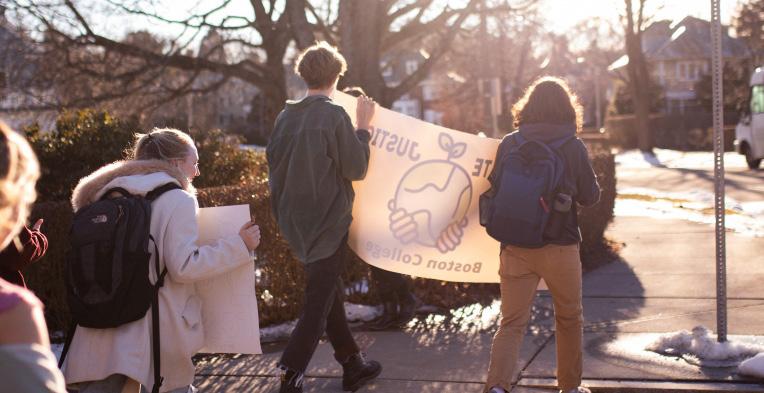
Divestment Debates on Campus Continue
By Eliza HErnandEz Projects Editor
ElEna romEro Editorial Assistant
Instead of urging people to have a perfect, zero-waste approach to reducing their carbon emissions, institutions should encourage individuals to consider the importance of sustainability, César Baldelomar said.
“It’s impossible to be totally carbon neutral,” said Baldelomar, a visiting lecturer and doctoral candidate in the School of Theology and Ministry. “But you know, you can make concerted efforts to try to, and so I think that something our institutions can do better is trying to get us to not care, but actually feel like we are a part of this.”
Boston College highlights the importance of sustainability with its environmental studies and global public health programs. And through various sustainability initiatives across Facilities Management and BC Dining, conversations about the environment are also prominent outside of the classroom.
But students and the University remain divided about the issue of divestment—the removal of investment capital from oil, coal, and gas companies for moral or financial reasons.
Globally, 1,599 institutions have divested, contributing to an approximate $40.5 trillion being directed away from fossil fuels. Of these divested institutions, 35.7 percent are faith-based organizations and 15.9 percent are educational institutions, according to the Global Fossil Fuel Commitments Database.
Boston Mayor Michelle Wu, scientists, politicians, and advocacy groups denounced the BC Board of Trustees’ investment in fossil fuel stocks in a 2021
letter to then–Attorney General Maura Healey.
“As concerned students, faculty, politician leaders, civic groups, and community members, we ask that you investigate this conduct and that you use your enforcement powers to order the Trustees of Boston College to cease their investments in fossil fuels,” the letter reads.
Amid differing opinions about the University’s investment policies, BC has not divested from fossil fuels. BC’s endowment—including its investment tied to fossil fuels—has enhanced the University’s funding for vital programs, according to a statement to The Heights in 2020.
“The endowment exists to provide a permanent source of funding for financial aid, faculty chairs, and student programs, as well as the University’s academic and research initiatives, and is not a tool to promote social or political change, however desirable that change might be,” the University told The Heights.
But as global temperatures rise and advocacy groups question BC’s adherence to Catholic teachings on sustainability, some students and faculty told that their concern about divestment is growing.
The Decades-Long Divestment Conversation
BC students and community members have called on the University to divest from fossil fuels for decades.
In the past, the University has adapted its investment approach following student pressure to re-evaluate. In the late 1970s and early 1980s, the University pulled its investments from companies in South Africa amid Apartheid after student groups and activists called on “BC to divest itself of corporations with holdings in South Africa,” according to a Heights article from 1978.
Read the full story online.

Editor’s Note: Projects Editor Lucy Freeman and Editorial Assistant Mei Dasgupta have chosen long-form stories about BC’s history, from how students find communities among the Jesuit, Catholic tradition to the fight for di vestment.
Concerns Over LGBTQ+ Resources
This story was originally published on March 25, 2024.
By ElEna romEro Projects Editor Carina murpHy Editorial Assistant
Valerie Lewis-Mosley, BC ’79, helped coin the term AHANA—African, Hispanic, Asian, and Native American— popularizing it among the student body during her time at Boston College.
In 1979, it became an official BC acronym with the renaming of the Office of Minority Student Programs to the Office of AHANA Student Programs—which eventually became the Thea Bowman AHANA Intercultural Center (BAIC).
But today, Lewis-Mosley is disheartened and concerned by recent administrative decisions regarding the BAIC.
Though the BAIC has historically been a space and resource for students identifying within the AHANA acronym, BC officially integrated resources for LGBTQ+ students into the center at the beginning of the 2023-24 academic year.
“To me, it was a limitation of addressing [LGBTQ+] needs by tagging it on to the AHANA context,” Lewis-Mosley said. “They have a big enough endowment to where they could have broadened meeting the needs of both our AHANA legacy and established an even broader in development for the LGBTQI community.”
The History of AHANA and the BAIC
In 1968, former University President Rev. Michael P. Walsh, S.J., initiated the Negro Talent Search Program to recruit prospective Black students to BC.
In an effort to become more inclusive
of all students of color on campus, BC hired a full-time counselor dedicated to minority students and rebranded the program as the Office of Minority Student Programs in 1979.
At the time, Lewis-Mosley was troubled by the use of the word “minority,” she said.
“The issue was the language,” Lewis-Mosley said. “To minimize the language of ‘minority’ over a group of students of color was thought to be pejorative, from my personal perspective.”
In response, Lewis-Mosley and her peer Alfred Feliciano, BC ’81, popularized the term AHANA among fellow students.
In 1979, the fall after Lewis-Mosley graduated, Feliciano aided in renaming the Office of Minority Student Programs as the Office of AHANA Student Program, a space and resource for students of color on campus, Lewis-Mosley said.
A decade later, BC rededicated the office to Thea Bowman, a nun who spent her life teaching children to embrace their identities and appreciate cross-cultural learning.
In April 2022, Vice President for Student Affairs Shawna Cooper Whitehead announced plans to restructure the BAIC to include resources for LGBTQ+ students—a plan that included dropping the AHANA acronym from the office’s name.
While the plan was initially paused after feedback from students and alumni, it resumed in April 2023, retaining the AHANA acronym. During the summer of 2023, BC formally integrated LGBTQ+ programming into the center and hired Ira Kirschner as an assistant director of the BAIC to spearhead LGBTQ+ initiatives.
An AHANA Founder’s Cause for Concern
Lewis-Mosley said she is concerned that the integration of LGBTQ+ resources into the BAIC will result in decreased resources for both groups.
“If you have a pie that can only be divided in eight parts, and you’ve already divided it, and you keep including more into that one limited pie, you’re not serving the needs of either community,” Lewis-Mosley said.
According to Cooper Whitehead, the recent integration has not decreased existing support for students of color.
“Since this transition, we have NOT reduced support or resources for our students of color and have remained cognizant of providing a sense of belonging for students from historically marginalized communities,” Cooper Whitehead wrote in a statement to The Heights.
Lewis-Mosley also said LGBTQ+ students deserve specially tailored solutions to their needs.
“I think it was a disservice to our LGBTQI community in a way because it took the onus of really expanding and broadening the conversation,” she said.
BC has consistently rejected proposals for an LGBTQ+ resource center for nearly two decades preceding the transition of LGBTQ+ support into the BAIC.
Students React to the Integration Some current BC students have concerns regarding the housing of LGBTQ+ and AHANA resources under the same roof.
Isabella Sampaio, MCAS ’25, said she was frustrated by BC’s decision to combine the support for two minority groups on campus.
Read the full story online.

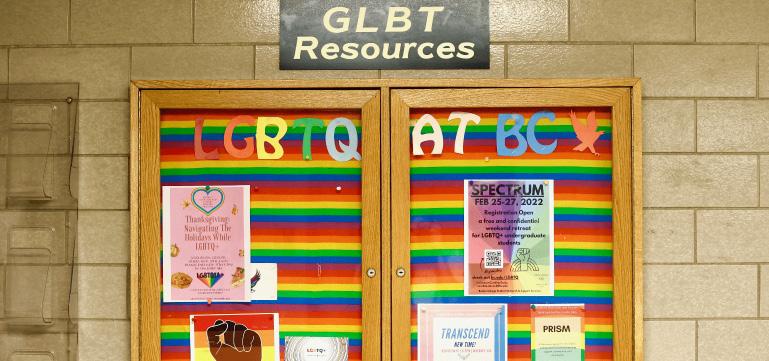
Non-Catholic Students Find Community on Campus
This story was originally published on Sept. 24, 2023.
By Eliza HErnandEz Projects Editor
The first statistic in the facts and figures tab on Boston College School of Theology and Ministry’s (STM) website states that the school places 10th overall in a worldwide ranking of theology, divinity, and religious studies.
With a swift scroll down the page, anyone interested would find that 85 percent of the 371-person STM student body is Catholic, with 16 percent belonging to the Jesuit order.
Scroll farther, and there are no statistics about any other religious identities in STM.
BC as a whole—founded in 1863 by the Society of Jesus to educate Irish-Catholic immigrants—continues to promote a Jesuit, Catholic intellectual tradition.
But with 15,075 undergraduate and graduate students across nine schools and colleges, BC’s religious teachings are not single-dimensional, but they rather contain a vast range of theological thought, according to the University’s website.
“The Catholic intellectual tradition is not static traditionalism, but is constantly revolving, drawing from the riches of the past to give life to the future and, in its search for truth,
engaged with every discipline and with all forms of belief and nonbelief,” the website reads.
While many BC students are Catholic, and the University is situated in Chestnut Hill—a town where residents’ primary religious affiliation is Catholic—non-Catholic students engage in spiritual dialogue and maintain a prominent presence within the University.
Rev. James Hairston, the campus minister of multi-faith programs at BC Campus Ministry, said there are 21 religious student groups on campus, including many that are non-Catholic.
From Judaism, Islam, and Buddhism to non-denominational Christianity, Protestantism, Orthodoxy, and more, Hairston said the myriad of religions represented through student-led groups demonstrates students’ individual ownership over how they approach their faith.
“They’re coming to their Catholicism at their own pace,” Hairston said.
“They come into their Jewishness at their own pace and come into their Islamic identity at their own pace that is dictated by them, and they own it.”
As religious minorities on campus, non-Catholic students especially exemplify virtue and leadership by seeking to build their own religious communities, Hairston said.
“The groups that we do have here in terms of non-Catholic or religious groups are here by virtue of the stu -
dents,” Hairston said. “So none of these groups could be here if it wasn’t for the students who desire to have them here.”
Hairston said he works with student faith groups when they need resources from the University. He manages finances for BC Hillel and the Muslim Student Association (MSA), for example.
“We’ve done bat mitzvahs on campus,” Hairston said.
“And I think there’s a reason why our Jewish students decide to come to a place like BC where they can approach their Jewish identity at their own pace and in a position which is comfortable to them.”
Avery Miller, MCAS ’24, is president of BC Hillel, a prominent club for Jewish students on campus. He said Hillel has consistently had a positive experience working with Campus Ministry to plan for events and holidays.
“I can’t speak for other clubs, but I can speak for Hillel and we definitely do feel supported,” Miller said. “And I’ve been in touch with Campus Ministry, and they’re all great.”
Hillel hosts Shabbats every week in the Gabelli lounge, Miller said, and it rents out the Thomas More Apartments and various chapels on campus through the University.
Campus Ministry also supports Hillel with funding for larger events and multi-faith celebrations, Miller said.
During Miller’s involvement with Hillel, the group hosted a dinner with MSA.
Miller said that he also hopes to partner with a Christian student association.
“We want to make a solid multi-faith event, you know, we want to share our traditions with the rest of the people at Boston College rather than keeping it to ourselves,” Miller said.
Abdullah Sayed, MCAS ’24, said MSA focuses on representing Muslim students but shares Hillel’s enthusiasm for including students of all backgrounds. As president, Sayed has noticed that some of MSA’s most regular attendees at events are non-Muslim students.
“It provides religious services to Muslims, but it’s also a place for people of all backgrounds to have a discussion and conversation about things that are meaningful to them and for them to meet people who are like-minded,” Sayed said.
Sayed said that MSA hosts four to five weekly events. Some events are strictly religiously oriented, like the Friday prayers and halaqa, while others consist of open dialogue, games, and refreshments.
“For me, and I think for a lot of people in MSA, it’s a community that although it’s based on Islamic values and virtues, it more broadly offers a place for people to engage in a welcoming alternative to BC norms,” Sayed said.
Beyond renting rooms from the University for weekly prayers and dinners, Sayed said that coordination for larger
celebrations rely on more complex accommodations from BC, especially from BC Dining.
For example, Sayed said eating schedules for celebrations like Ramadan require meals during times outside of BC Dining’s typical hours. Although Sayed said that getting proper accommodations has been difficult at times due to scheduling conflicts, he said MSA has continuous conversations with the University and BC Dining.
“The University is making an effort and there’s been a dialogue with BC dining, for example, for the last few years,” Sayed said. “They’ve been trying to improve their accommodations, and they’ve been listening to constructive feedback that we provided.”
Sayed also said the Women’s Center invited MSA to an event about women’s rights protests in Iran, but on the day the event was supposed to take place, an employee of the Women’s Center informed MSA that it had been canceled without any communication prior to that interaction. This moment, Sayed said, exemplified how BC can increase its attention to interfaith events.
“What I would like to see is the BC administration putting in more effort to kind of endorse interfaith events that Campus Ministry hosts and that sort of thing,” Sayed said.
Read the

This story was originally published on Nov. 13, 2023.
COURTESY OF HEIGHTS ARCHIVES
NICOLE VAGRA / HEIGHTS SENIOR STAFF
the BAIC, students and the co-founder of AHANA express hesitation with what is to come
Opinions
Editor’s Note: Ava Sjursen and Addie Kinnaly—our opinions editors—have compiled the most important op-eds, columns, and editorials to give you a glimpse of the conversations happening on campus today.
Op-Ed: Don’t Fear the Heat: BC Fails to Protect Free Speech
By Peter Coquillette
For years, as Americans—and even as Boston College students—it has felt increasingly difficult to find something that unites us. But we often overlook a unifying cause foundational to the United States: freedom of expression.
As a former columnist for The Heights, I wrote a column in 2023 titled “Navigating Political Discourse and Encouraging Constructive Conversations,” addressing some of the problems in discourse at BC. A recent story from The Heights about BC’s heavy restriction on student protest, however, reminded me that these issues are still alive.
This piece will highlight BC’s failure to protect free expression and foster open discourse. Free speech and open discourse environments are not about defending and encouraging what we agree with, but about defending our neighbor’s right to speak their mind freely—even when we disagree with them.
As reported by The Heights , BC forced pro-Palestinian protestors to resubmit and alter their proposed itinerary and speeches four times before being approved to protest. Obtaining this approval required an 80-day process that began on Nov. 18, 2024.
This extensive delay was not an isolated bureaucratic mistake. It reflects BC’s broader failure to uphold free expression. BC’s student demonstration policy requires students to get administrative approval to protest, stating, “Boston College reserves the right to condition the time, place, and manner of proposed demonstrations, and to withhold approval of proposed demonstrations
This policy leads to delays and issues regarding the right to protest.
“If breaking news happens on a Friday, that means you’re waiting well into the next week in order to be able to get out and speak about that on campus,” said Laura Beltz, a lawyer and director of policy reform at the Foundation for Individual Rights and Expression
(FIRE), I spoke with Beltz before the Palestine protest incident. Nonetheless, she predicted that the slow, bureaucratic approval outlined in BC’s policy would hinder student demonstration efforts. Her mistake was in thinking it would take a few days. Instead, it took almost 12 weeks.
The student demonstration policy may allow the administration to wait as long as they wish, but it also says, “Boston College has a long-standing commitment to protecting the right to free expression, including the right to protest.”
The keyword here? The right to protest. Taking 80 days to approve a student demonstration treats protesting as a privilege. At the time of the protest’s request for approval, the Israel-Gaza conflict was materially different. Students are now protesting a cause that changed from when they requested approval.
FIRE—a leading First Amendment legal advocacy group—criticized BC’s policy in an open letter, calling for fast-
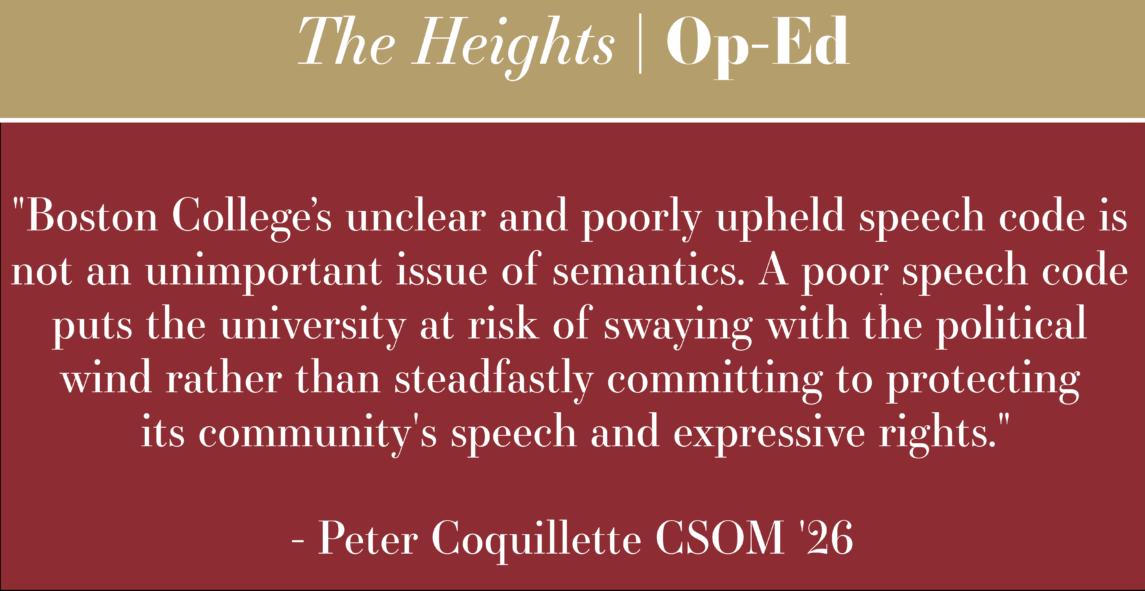
er approval, removing vague language, and less red tape.
BC’s unclear and poorly upheld speech code is not an unimportant issue of semantics. A poor speech code puts the university at risk of swaying with the political wind rather than steadfastly committing to protecting its community’s speech and expressive rights.
As students, we must look at ourselves in the mirror to ensure that
we, too, are doing our part to foster a flourishing discourse environment. And there is room to grow. Boston College placed 189th out of 251 colleges in FIRE’s 2024 free speech rankings. We ranked 239th in students’ openness to discuss controversial ideas and 209th in self-censorship.

You Can Force the Triple, but You Can’t Fend Off the Trouble: Boston College’s
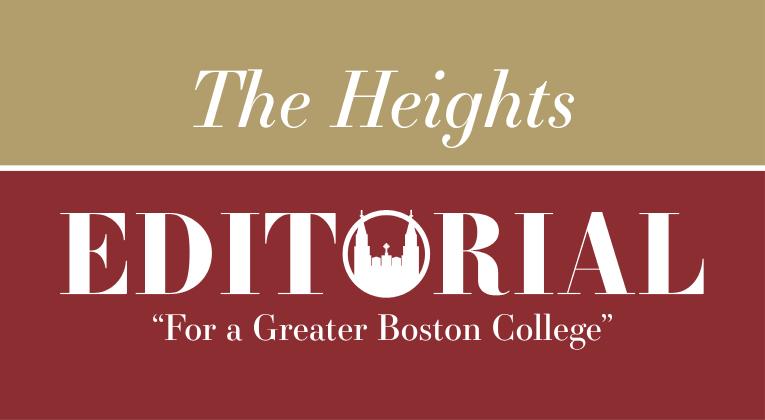
This editorial was originally published on September 25, 2024. The statistics have not been updated.
B y t H e H eigH ts e ditoria L B oard
Last month, 2,394 incoming Boston College freshmen received an email that revealed long-awaited housing decisions. Students anxiously logged into their housing portals, wondering whether they would be placed on Newton or Upper. Many, however, were in for a rude awakening when they found three names listed next to their room numbers rather
than two.
One of the first things incoming first-year students have to interface with at BC is their living situation.
Most are living away from home for the first time in their lives, many are uncertain about what the college experience will hold for them and harbor anxieties about the new workload.
The student experience shouldn’t be plagued by housing worries. Yet it often is.
Many freshmen this year have been subject to living in forced, or “lofted,” triples. These forced triples, originally
It’s a Cliché for a Reason

27, 2025.
By Tommy Roche
In the words of a better columnist than me: We’ve arrived, inevitably, at the end of things. Unlike her, I can’t make my last Heights column a bohemian masterwork of creative self-reflection. But I can leave you with a few of the world’s most common pieces of advice—phrases so familiar we call them cliches. Overused? Maybe. But, through my life at BC, I’ve come to believe they’re overused for a reason.
My life, like anyone else’s, has criss-crossed with a cacophony of cliches. But there’s a difference between hearing a clichéd saying and truly understanding it. As I graduate from college and transition into the real world, here are a few of those overused pieces of advice that I hope you can inherit.
“Touch Grass” We can say we use it to relax. We can compare it to people reading newspapers in
train cars. But the technology we use to sedate ourselves—especially short-form smartphone content—is just abominable. And BC students are in an amazing position to fight it. If, like the average college student, you spend 4.5 hours a day on social media, you are spending 28 percent of your waking life—and a whopping 57 percent of your leisure time—in a vacuum that squeezes your attention span, distorts your beliefs, and chips away at your self-esteem. Younger generations, born a few years deeper into the digital era, are seeing even more horrific effects of the iWorld on their cognitive abilities, social competence, and mental resilience. If you’re worried your time has gone to waste, don’t worry—it’s been commodified, packaged, and sold to the highest-bidding digital advertiser.

Housing Crisis Is Now
constructed to house two students, come as an involuntary disappointment for the new undergraduates selected off the waitlist or by random draw.
The Office of Residential Life did not respond to multiple requests for comment.Online education coursesStand-up comedy shows
These lofted triples don’t just feel like a tight squeeze to live in–they are in fact technically below the “minimum standards of fitness for human habitation” according to the Massachusetts Housing Code.
The city of Newton Health and Human Services Department granted BC a variance to the minimum square footage requirements to allow the school to implement these lofted triple rooms.
One recently admitted freshman expressed his disdain for the accommodations that many of his classmates were forced into after visiting a friend’s forced triple.
“Something needs to be done about the quality [of the dorms],” he said. “Hearing about all of the forced
triples in rooms meant for doubles is ridiculous. These situations shouldn’t be happening given the amount of tuition money being poured into BC every year.”
The difficulties with housing don’t end after freshman year either. From the brutal process of the eight-man lottery for sophomores to the senior struggle to score a Mod, BC not only lacks enough actual rooms but also maintains a system of stress, frustration, and dissatisfaction.
BC advertises itself as a school with a strong on-campus culture and community. While it is common for most college seniors to live off-campus, over 90 percent of BC seniors forgo the freedom of off-campus living so they can be part of an on-campus community for one final year. One of the school’s promotional videos for prospective students boasts the importance of campus living to students at BC.
“BC offers a meaningful residential life experience and campus community,” the video narrates. “BC students take pride in their freshman year roots, affectionately competing over
which campus [Newton or Upper] is superior.”
Housing shortages at BC are not anything new. A Heights article from 1970 chronicles the then struggle to accommodate BC’s overflowing student housing infrastructure. The striking lack of space and beds for students eventually manifested into a temporary (or rather, modular) solution, with the University electing to install the 76 sixman units that have become a staple of senior living: the Mods.
Another article in that same 1970 edition remains particularly relevant to BC’s modern problems.
“As early as 1965 there was talk (and some actual plans on paper) for new dormitories on the lower campus,” the article states. “After many administrative delays, the final plans for the lower campus were announced this past March. The plans were comprehensive and impressive. And they had little hope of being implemented.”

Bubbles, Breakthroughs, and the College Quest To Find Yourself
This story was originally published on March 25, 2025.
By Lucia Hernandez
I’ve always loved bubbles. But maybe my fondness for them isn’t just because of their seemingly magical qualities—it’s because I live in one.
Puerto Rico, the island in the Caribbean I call home, only has a little more than three million inhabitants within its 3,515 square miles. Everyone I know knows each other, looks alike, and holds similar values and beliefs.
In my town specifically, every student goes to one of five schools and will eventually live right next to everyone they have ever known. I loved it, and I still do, but within the beauty of my innocently iridescent bubble, I never saw the world for what it truly was.
But, my bubble popped the moment my parents left my dorm, and I was officially living outside the safety of my soapy enclosure.
Seven months later, I can hardly recognize the girl standing in Duchesne West with tears streaming down her face. She looks more or less the same, except maybe a little tanner. She hopes to graduate as an analyst, and she’s undoubtedl terrified of a Boston winter.

I was told that college is where you meet your best friends, pull all-nighters, meet your future spouse, and have a wild time. But I was also told that college is where you find yourself. I thought this idea was an urban legend. I stood tall with a clear image of my future in mind, and I wondered what there was left to find. If I could talk to that girl seven months ago, I’d tell her that she was about to discover so many parts of herself she didn’t know. Better yet, she would rediscover parts of herself she had glanced over but had never taken the time to love or even fully understand. I was prepared for college in the
social sense. I tried to be friendly to everyone and went out of my way to talk to people who did not run in my immediate circle. By September, I had already met the people I’d be spending most lunches with and the girls I’d be living with the following year. I was nowhere near ready for the flash floods of media and new information I’d find myself struggling to swim in. I came in as a business analytics major and journalism minor, but after two Intro to Economics lectures, I declared to my mother that I was going to switch my major.

CONNOR O’BRIEN / HEIGHTS EDITOR PARKER LEAF / HEIGHTS SENIOR STAFF
This story was originally published on April
CONNOR O’BRIEN / HEIGHTS EDITOR
CONNOR O’BRIEN / HEIGHTS EDITOR
Arts
Cynthia Erivo Set to Perform at 33rd Pops on the Heights
This story was originally published on July 26, 2025.
B y M ilo P riddle Asst. Arts
Editor
Grammy, Emmy, and Tony Award winning singer and actress Cynthia Erivo is set to perform at the 33rd Annual Pops on the Heights gala on Sept. 26.
Erivo, best known for starring as Elphaba in the film adap tation of Wick ed, brings to the stage a slew of Broadway, West End, and film credits, includ
ing a Tony Award-winning performance as Celie in the 2015 Broadway revival of
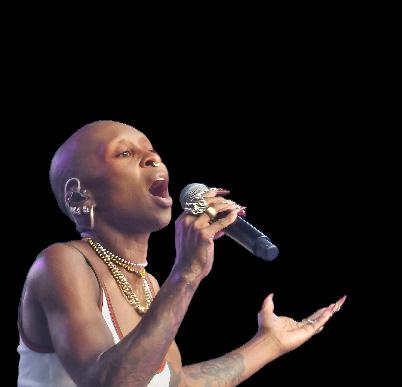
By Milo Priddle Asst. Arts Editor
Despite being the most prominent improv troupe at Boston College, the meaning behind the name My Mother’s Fleabag is largely unknown. Forty-five years after its founding, the reason for this designation has grown somewhat ambiguous. As the story goes, the group is named after a motel in Cape Cod owned by the founder’s mother—dingy, grotty motels are often referred to as “fleabag motels,” insinuating a population of fleas residing there.
The somewhat squalid connotation is not the true meaning of the group’s name, though.
“That’s not why we’re named that— we’re not grungy at all,” Director Libby Howenstein, MCAS ’25, clarified.
For Fleabaggers, the fleabag nature of the motel exemplifies the uncertainty of what you could come across at such an establishment and also at their shows.
“When you go to a motel on the side of the road—or something like that—and you open a door, you never know what you’re going to find or what you’re going to get,” said Howenstein. “And Fleabag is sort of like that. When you go to a show or you see a scene or a game or whatever we’re doing, you never know what you’re going to see, you’ll never know what you’re going to get. So it’s kind of like a surprise.”
With 45 years of history, Fleabag claims to be the oldest improv comedy
troupe in the country. But without any real means of verification, how much truth there is to the claim is uncertain, and as much is admitted by the group.
“There might need to be an asterisk there,” said Director Will Sweeney, MCAS ’25.
Whether or not they are the oldest in the country, Fleabag is certainly one of the most successful collegiate improv groups.
The group’s alumni include Maile Flanagan, Nancy Walls Carell, Wayne Wilderson, Cameron Esposito, Lou Wilson, and Amy Poehler. These notable figures have helped provide the group with much attention on campus.
Fleabag’s popularity has also undoubtedly factored into the creation of a handful of other BC comedy groups that have popped up over the years. Fortunately, the growing comic population on campus hasn’t created competition or animosity between groups.
“People always ask us, ‘Is there beef?’” said Howenstein. “It’s so far from that.”
On the contrary, a portion of the
Editor’s Note: Maddie Mulligan, Maria Beatriz Saldanha, and Milo Priddle—our arts editors—pulled together stories outlining Boston College’s fall arts scene: a season full of big-name concerts, comedy gold, and showcases from performance groups all across campus.
Men I Trust Takes On Stokes Set
This story was originally published on Sep. 15, 2024.
B y J u NS oo c hu NG Heights Staff
The Campus Activity Board’s annual Stokes Set returned to Boston College on Saturday evening, with a cozy yet captivating performance by the indie-pop sensation Men I Trust. The Montreal-based band, which boasts over 8 million monthly listeners on Spotify, drew an eager crowd to the Stokes Lawn.
Students gathered near the barricades or relaxed for a picnic, and the excitement was evident even an hour before the show. Some students held up handmade signs, establishing themselves as part of the niche Men I Trust fanbase.
The first set began at 6 p.m. with DJ Frank White, who returned this year for the opener. A mix of crowd-pleasing hits like “Firework” and “Mr. Brightside” elevated the
crowd’s energy, creating an atmosphere of anticipation as the sun set over Lower Campus. DJ Frank succeeded in delivering an opening of music and community for BC students by providing tunes for both energetic and laid-back enjoyment. Men I Trust took to the stage at 7 p.m., kicking the show off with its hit single “Tailwhip.” As the Stokes Set light beams illuminated the side of Stokes South, the concert’s atmosphere shifted into an entrancing vibe.
Lead singer Emma Proulx engaged the crowd with her vocals, and her natural charm shone through the performance as she took time between songs to chat with BC students.
“Are you guys all studying different things?” Proulx asked.
Read the full story online.


audience at any comedy show on campus is made up of the other groups coming to be supportive.
“I know that Shovelhead or Asinine are going to come to our show, and we’re going to go to their show, and we’re going to laugh super hard—we’re going to participate as loud as we can,” said Howenstein. “Fleabag is so tight. It’s like our own little family, but it’s nice that we have family friends.”
While the comedy groups are turning out in number for each other, the wider BC community also jumps at the chance to see their peers perform. Fleabag shows almost always have people happily standing in the back or even sitting on the floor after the seats fill up.
“We’re lucky on this campus that people love the comedy groups,” said Sweeney. “I feel like there’s a stigma of ‘oh, collegiate improv is cringy’ or whatever but … people are so kind and supportive.”
Read the full story online.

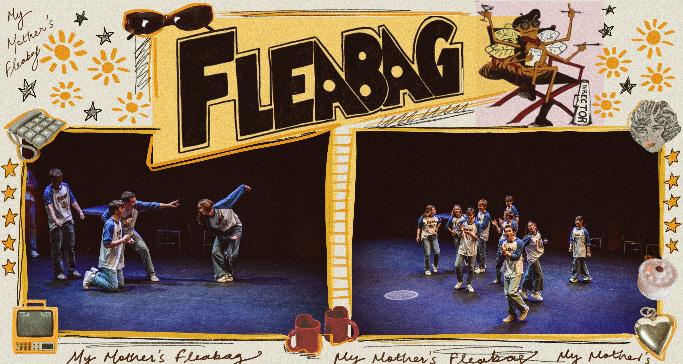
This story was originally published on Oct. 27, 2024.
By NaNati Getachew Social Media Director
Phaymus rushed the stage dressed in matching black and red outfits. The hiphop team delivered a thrilling routine, featuring a mashup of songs by artists like Kendrick Lamar and City Girls. BC
On Tap then took the stage with a fun tap routine, skillfully making their way around the space to Flo Rida and Kesha’s “Right Round.”
The newest group of the night, K-Pop Dance Crew, made its Rookie Showcase debut in eye-catching outfits with a consistent pink, black, and white theme. With its constant transitions and swapping out of rookie dancers throughout the set, this group brought a fun energy to the showcase.
The Golden Eagles Dance Team left their spirited mark on the night with their sequined tops and signature pom-poms gliding through a sharp routine to songs like “HOT TO GO!” by Chappell Roan and “Shut Up and Drive” by Rihanna. The group was followed up by one skit of many from the night, as the hosts tried to find the scariest “monster” of all, coming across hilarious characters, including the love monster, brain rot monster, and career monster.
The crowd roared through UPrising’s fiery dance routine as members made their way all around the stage, creating a sassy spectacle in a matching red and black look.
“It was so much fun to see our rookie set come to life,” said Madeleine Anders, a new member of UPrising and CSOM ’28. “All of the teams are so supportive of one another and Rookie Showcase
night with dancers in matching jerseys. Its thrilling blend of modern and traditional moves and music reverberated throughout the room as the cheers got louder throughout their routine.
Rookies from the Dance Organization of Boston College performed skillful classical spins and leaps to “Maneater,” by Nelly Furtado. They were followed by Vida de Intensa Pasión as spinning bright green dancers flooded the space. The group delivered amazing stunts and thrilling Latin choreography.
Fuego del Corazón also brought up the energy, as its black and white sparkling looks and stunts brought the crowd to an overwhelming uproar. Delivering a contagiously exciting routine to the popular Christian hip-hop song “King Jesus,” Capital Dance Ministry performed in swift synchronization.
BC Irish Dance created an impressive display of Irish dance through its small but mighty crew of three rookies to Roan’s “Red Wine Supernova.” AEROdynamiK’s metallic silvers soon flooded the stage with quick moves to familiar voices like The Weeknd and Ariana Grande. Their simple but elevating outfit changes brought the already electrified crowd to an overwhelming roar.
By Maria Beatriz SaldaNha Assoc. Arts Editor
In 2009, Boston College’s music scene was missing something. Earl Edwards, BC ’10, decided it was time for a change. Inspired by other Boston schools embracing R&B on campus, he founded B.E.A.T.S.—Black Experience in America Through Song—bringing a long-overdue space for Black artistry to campus. Although not a singer himself, Edwards saw the need for a Black, R&B-focused a cappella group at BC and took action. He began recruiting students who could sing and shared his vision with them. Together, they worked to establish the group’s name, mission, and purpose, laying the foundation for what B.E.A.T.S. would become. Today, Edwards is a pro-
fessor at BC’s Lynch School of Education and Human Development.
B.E.A.T.S. is the only a cappella group at BC dedicated solely to performing music by Black artists. Over the past decade and a half, they have grown substantially, both in participants and recognition.
Victoria Adegboyega, MCAS ’26, has been involved with B.E.A.T.S. since her freshman year. Persuaded by a friend to audition for the a cappella group, she felt the magic of music and the group’s palpable energy immediately. Now a junior and president of B.E.A.T.S., Adegboyega leads a thriving group of 14 students—reflecting a growth of five members in two years.
“I have been involved in B.E.A.T.S. since my freshman fall, when I was a timid girl [who] wasn’t confident in my own thinking,” Adegboyega said. “And I had to have my friend force me to audition. But this year, I have been fortunate enough
to be the president of this group, of this growing group.”
Most years, B.E.A.T.S. hosts one performance per semester. This spring, the long-awaited Black History Month Showcase was held at the Vandy Cab Room on Feb. 8 at 6:30 p.m.
The a cappella group crafts the setlist early in the year and practices throughout the fall semester. Alongside her co-musical directors, Toni Martin, CSOM ’27, and Rose Dieujuste, CSOM ’27, Adegboyega ensured the team had enough time to practice and perfect their performance. In a collective effort, the musical directors arrange the songs, dissecting them piece by piece or voice by voice, until they have a final product they are satisfied with.
Read the full story online.

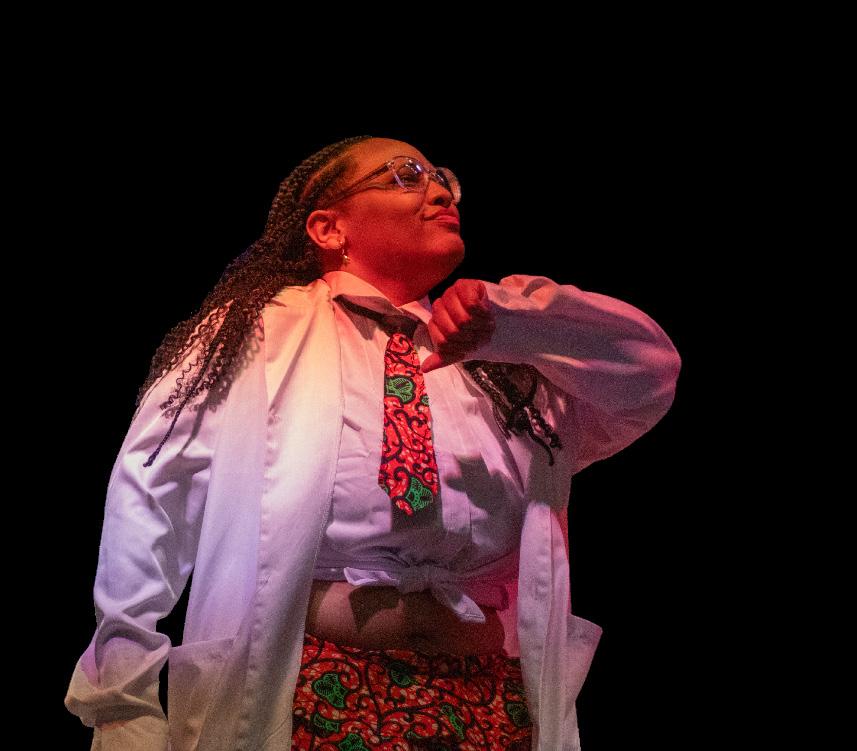
F.I.S.T.S. opened its routine with a school-themed skit, with half the team in schoolgirl outfits and the other half dressed as cheerleaders. The all-women’s step team brought chairs on stage, telling a story and delivering a flawless step routine with engaging coordination and passion. An animated crowd sang along to Shania Twain’s “Man! I Feel Like A Woman!” as BC Dance Ensemble’s impressive kicks and spins made its mark on the night. Then Synergy took the stage, moving passionately through a fast-paced hip-hop choreography to artists like Soulja Boy in opened its routine in lab coats and goggles for a skit which built up to an outstanding use of the dance space, with multiple afro-beat

TRISHNA CONDOOR / HEIGHTS STAFF
JASHODHARA JINDAL / HEIGHTS EDITOR
SHANE SHEBEST/HEIGHTS
This story was originally published on Feb. 27, 2025.
Editor’s Note: Maria Stefanoudakis, Emily Roberge, and Sebby FitzGerald—our sports editors—have compiled the most important sports stories from the past year to introduce the Class of 2029 to the world of Boston College athletics.

CHRIS TICAS / HEIGHTS SENIOR STAFF
No. 1 BC Falls Short, Terriers Take Beanpot
Feb. 11, 2025.
By Maria Stefanoudakis Sports Editor
BOSTON, Mass. — Seventy seconds is less than 2 percent of total regulation in a hockey game, which really doesn’t sound like a lot. The thing about sports, though, is that every last second counts for something.
So 70 seconds—well, that’s practically an eternity.
nal, 70 seconds was all it took the game to complete ly change course, as No. 9 Bos ton Univer sity sent two pucks whizzing



Dietz: Replacing Ezeiruaku, QB Shift, and More on BC Football’s Next Step
By Graham Dietz Heights Senior Staff
“We’ll be back. [Boston College] will be back.”
That’s what BC football head coach
Bill O’Brien said following the Eagles’ season-finale loss to Nebraska in the Bad Boy Mowers Pinstripe Bowl. BC scored two points in the first half but managed to tack on 13 in the final quarter to make it a respectable fivepoint loss.
So when O’Brien said “We’ll be back,” what does he mean exactly?
Back to a loss in the Pinstripe Bowl? Back to a 7–6 final record, and a 4–4 mark in the ACC? Back to the very mediocre consistency that has defined how the Eagles play football for the last decade or so?
Obviously not, because O’Brien’s direction is more clear than that, and he preaches it every time at the podium. He also could have accomplished a feat not done since 2009—finish with eight or more wins in a season—in just his first year on the Heights.
But he didn’t. That will almost always raise an eyebrow from BC’s fanbase, which has been subjected to watching a dozen seasons without something to be truly excited about. So what’s different about this time?
The truth is, predictions are meaningless in college football. You can’t predict how a team will do until it takes the field on the first Saturday of the college football season because of the irregularity of the business in this day and age. But there are factors you can measure leading up to that week to make a guess.
That includes recruiting, which players you pick up in the transfer portal, and how much of your team you retain from the previous season.
Now that the season is over, that is where O’Brien and his staff are chiefly focused.
“I really enjoy the job, and I think there’s a lot of good players in that locker room coming back for 2025,” O’Brien said. “I’m looking forward to taking a couple weeks off, be back January 13 to start school, and we’ll get going on 2025.”
Looking back on this season, and
looking ahead, here are some final thoughts heading into BC’s next campaign.
Notes – Lewis Bond announced that he will return to BC next season and has the chance to cement himself as one of the best wide receivers in BC history statistically. Bond is an extremely reliable wideout who plays out of the slot or on the outside and ranked first in receptions (67), receiving yards (689), and average receiving yards per game (53). He is a dynamic, fluid route runner with reliable hands, and has a deep love for the school. – O’Brien’s 2026 recruiting class is ranked 21st in the country, according to 247Sports, sitting between Florida and Miami. Other notable ACC teams in the top-25 are Florida State (9), Clemson (12), and Syracuse (17).
Read the full story online.

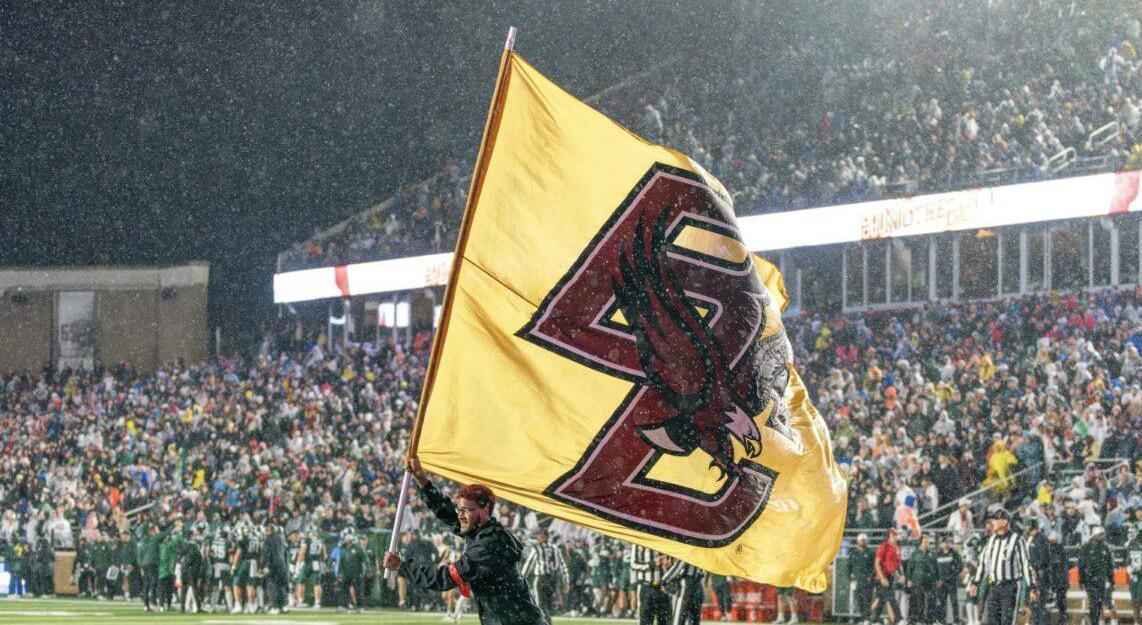
No. 2 BC Misses NCAA Championship for First Time Since 2016
By Genevieve Morrison Newton Editor
With No. 3 Northwestern leading No.
2 Boston College 12–11 and four seconds left on the clock, Mia Mascone fired the final shot of the game with a chance to tie things up.
But Northwestern goalkeeper Delaney Swetizer grabbed it as the buzzer rang and Northwestern (19–2, 8–0 Big Ten) beat BC (19–3, 8–1 Atlantic Coast), keeping the Eagles from the national championship game
for the first time since 2016 and crushing the Eagles’ hopes of back-to-back titles.
BC is no stranger to the semifinals—this was its eighth straight appearance. But this time, the game was a little closer to home.
After playing in the national championship against Northwestern last year in Cary, N.C., this year’s semifinal rematch between the teams took place at Gillette Stadium in Foxborough, Mass., just 24 miles from Chestnut Hill.
Despite the spitting-turned pouring rain in Foxborough, Friday’s game brought 10,080 fans to Gillette, marking the most fans of any women’s lacrosse semifinal
since 2002. BC head coach Acacia Weinstein-Walker attributed that turnout to the culture at BC and similar programs. declared “I think the girls in our program play the right way,” Weinstein-Walker said. “They play unselfishly, they play really gritty, they play really tough, and I think they’ve captured the heart of a lot of young lacrosse players. I think that’s a tribute to the kind of people that we have in our program.”
Read the full story online.

The Commitments That Built Donovan Ezeiruaku
2024.
By Sourabh Gokarn Heights Senior Staff
Cindy Ezeiruaku wasn’t exactly a fan of her son’s decision to play football.
The 7-year-old had tried baseball, he’d tried soccer, and he’d tried basketball. But football was different. Football, he knew, was where his future lay.
To earn his mother’s grudging approval, Donovan Ezeiruaku made a commitment.
“‘You have to get all good grades, and if you come home with one bad grade—that’s it,’” Cindy said. “‘No more football, and that will be that.’”
Ezeiruaku stayed true to his word so he could stay on the football field. It wouldn’t be the last time.
Whether it was staying home to play alongside his childhood friends at Williamstown High School or refusing to entertain transfer portal offers while starring for Boston College football, ironclad commitment is second nature to Ezeiruaku.
“He never failed on his commitments,” Cindy said. “He stayed loyal to what it is he wanted to do—his dreams and his aspirations.”
That loyalty produced one of the greatest edge rushers BC has ever seen.
Through four seasons in Chestnut Hill, Ezeiruaku has seen it all—two head coaches, a 3–9 season, and a bowl win.
He’s also done it all. Ezeiruaku has delivered sacks, game-changing forced fumbles, poised leadership, and more sacks.
He’ll leave BC as one of the NCAA’s
premier defensive ends and with a management degree in his hands as well.
“He’s what it’s all about at Boston College,” Eagles head coach Bill O’Brien said. “He’s a captain, he’s a great student, great player, one of the best players in the country.”
Unlike the other sports Ezeiruaku tried growing up, football demands a unique aggressiveness.
A hunger for contact doesn’t just help— it’s a requirement.
His youth basketball coach Antoine Sabb recognized that aggressiveness in a 7-year-old Ezeiruaku. He knew the hardwood wasn’t its proper home.
“I was really aggressive playing basketball, and he recommended to my dad that I should try out football because of how aggressive I was,” Ezeiruaku said.
Sabb, whose son Keon Sabb currently starts at Alabama, is familiar with promising young talent. But Ezeiruaku, even at the age of seven, still managed to stand out.
“He was on the [basketball] team with some kids that could play,” Sabb said. “He was very explosive, so you could tell obviously that he was an elite athlete.”
The same aggressiveness that made Ezeiruaku such a seamless fit on the football field was what concerned his mother.
“I was furious,” Cindy said. “He’s gonna be knocking over kids, or they’re gonna knock him over.”
Sabb, convinced of Ezeiruaku’s talent, tried persuading his parents to let him try out for the youth football team. Cindy wouldn’t budge.
“[Sabb] had approached my husband
about letting Donovan try out football,” Cindy said. “I was totally against it when they told me. I was like ‘No. They can do track. They can do tennis. Football—no.’”
Sabb persisted, however, and with his father Sonyx’s assistance, Ezeiruaku made his way to tryouts.
“They kind of snuck me out on the field—not really telling my mom all the information of where I was going that specific day,” Ezeiruaku said.
Once he made the team, it didn’t take Ezeiruaku long to fall in love with the sport. Football had it all—the competition, the hard contact, and the allure of grand aspirations. The choice couldn’t have been more obvious for him.
“I chose the sport my mom hated the most,” Ezeiruaku said.
From his first days on the football field, Ezeiruaku took the sport seriously. To some, he took it a little too seriously.
Instead of tending to the usual youth football worries, like scoring touchdowns or just having fun, Ezeiruaku thought bigger. He wanted to win, and if winning required him to coach up his teammates on the sidelines, then that’s what he would do.
“Parents had mistaken his passion for arrogance,” Cindy said. “They would say, ‘Why is he talking to my child like he’s the coach?’”
That passion permeated his entire approach to football from the very beginning. No sacrifice was too big, so long as it served his larger purpose.

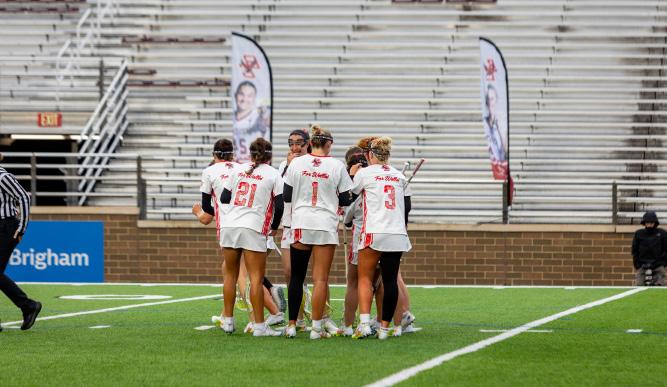
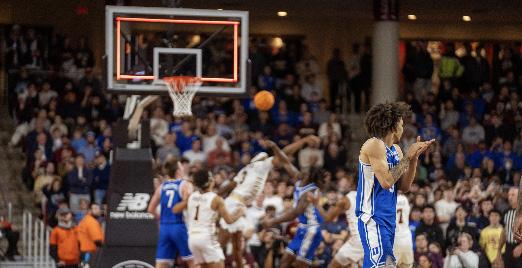
By Maria Stefanoudakis Sports Editor
About eight hours after Boston College announced the hiring of Haub Vice President for Mission and Ministry Rev. Jack Butler, S.J., as its new president, BC men’s basketball held Virginia Tech to 11 points in the entire first half of its ACC matchup. It might be a bit early to say a curse has been lifted off BC’s athletic program considering Butler hasn’t even taken office yet—and won’t until the summer of 2026. But for many BC Athletics fans, just saying goodbye to University President Rev. William P. Leahy, S.J., is a sign of hope in itself. To be fair, Leahy’s term hasn’t been horrible by most standards. In fact, BC Athletics has seen its fair share of success in the past 29 years. Men’s hockey has gone to nine national championships during Leahy’s tenure. The women’s lacrosse team has made the NCAA
tournament every year since 2013 and advanced to seven straight national championships, winning two. Those sports have brought some pride to the University’s students and alumni.
But BC fans want to be good at the sports that bring in the most publicity and revenue—in other words, they want the Eagles to dominate on the gridiron
come from keeping good coaches around. After the 2023 season, BC lost two of former head baseball coach Mike Gambino’s key assistants due to “budgetary constraints.” Gambino left to coach at Penn State soon after that. That was the year after the Eagles went 37–20 and made the NCAA tournament.

This story was originally published on May 23, 2025.
CHRIS TICAS /
PAUL CRIADO / HEIGHTS STAFF
SARAH FLEMING / HEIGHTS EDITOR

